初中英语考点整理
【初中英语】考点大汇总

初中英语中考考点大汇总1 (see 、hear 、notice 、find 、feel 、listen to 、look at (感官动词)+ do eg :I like watching monkeys jump2 (比较级and 比较级)表示越来越怎么样3 a piece of cake =easy 小菜一碟(容易)补:a place of interest 名胜4 agree with sb 赞成某人5 all kinds of 各种各样a kind of 一样6 all over the world = the whole world 整个世界7 along with 同……一道,伴随……eg : I will go along with you 我将和你一起去the students planted trees along with their teachers 学生同老师们一起种树8 As soon as 一怎么样就怎么样9 as you can see 你是知道的10 ask for ……求助向…要…(直接接想要的东西)eg : ask you for my book11 ask sb for sth 向某人什么12 ask sb to do sth 询问某人某事ask sb not to do 叫某人不要做某事13 at the age of 在……岁时eg:I am sixteen I am at the age of sixteen14 at the beginning of …………的起初;……的开始15 at the end of +地点/+时间最后;尽头;末尾eg : At the end of the day16 at this time of year 在每年的这个时候补:at least 至少17 be /feel confident of sth /that clause +从句感觉/对什么有信心,自信eg : I am / feel confident of my spoken English I feel that I can pass the test18 be + doing 表:1 现在进行时2 将来时19 be able to (+ v 原) = can (+ v 原)能够……eg : She is able to sing She can sing 补:base on 以…(为)根据20 be able to do sth 能够干什么eg :she is able to sing21 be afraid to do (of sth 恐惧,害怕……eg : I'm afraed to go out at night I'm afraid of dog22 be allowed to do 被允许做什么eg: I'm allowed to watch TV 我被允许看电视I should be allowed to watch TV 我应该被允许看电视23 be angry with sb 生某人的气eg : Don't be angry with me24 be angry with(at) sb for doing sth 为什么而生某人的气25 be as…原级…as 和什么一样eg : She is as tall as me 她和我一样高26 be ashamed to27 be away from 远离28 be away from 从……离开29 be bad for 对什么有害eg : Reading books in the sun is bad for your eyes 在太阳下看书对你的眼睛不好30 be born 出生于31 be busy doing sth 忙于做什么事be busy with sth 忙于……32 be careful 当心;小心be close to…离…很近33 be different from……和什么不一样34 be famous for 以……著名35 be friendly to sb 对某人友好36 be from = come from 来自eg :He is from Bejing He comes from Bejing Is he from Bejing ? Does he come from Bejing ?37 be full of 装满……的be filled with 充满eg: the glass is full of water the glass is filled with water38 be glad+to+do/从句39 be going to + v(原)将来时40 be good at(+doing) = do well in 在某方面善长, 善于……41 be good for 对什么有好处eg : Reading aloud is good for your English42 be happy to do 很高兴做某事43 be helpful to sb 对某人有好处eg : Reading aloud is helpful to you 大声朗读对你有好处Exercising is helpful to your bady 锻炼对你的身体有好处44 be in good health 身体健康45 be in trouble 处于困难中eg : She is in trouble They are in tronble46 be interested in 对某方面感兴趣47 be late for = come late to 迟到eg: Be late for class 上课迟到48 be like 像……eg : I'm like my mother49 be mad at 生某人的气50 be made from 由……制成(制成以后看不见原材料) 补:be made in 在…生产或制造51 be made of 由……制成(制成以后还看得见原材料)52 be not sure 表不确定53 be on a visit to 参观54 be popular with sb 受某人欢迎补:be please with 对…感到满意55 be quiet 安静56 be short for 表**的缩写eg: 陶is short for 陶俊杰57 be sick in bed 生病在床58 be sorry to do sth be sorry for sb eg : I am sorry for you59 be sorry to hear that60 be sorry to trouble sb eg : I am sorry to trouble you61 be strict in doing sth 严于做某事eg : He's strict in obeying noles62 be strict with sb 对某人要求严格eg: Some students are not strict with them selves 这些学生对自己不严格63 be strict with sb in sth 某方面对某人严格64 be supposed to do 被要求干什么65 be sure 表确定66 be sure of doing sth 对做某事有信心eg: He is sure of winning I am sure of learning English well67 be sure of sth 对做某事有信心eg: I'm sure of my head (my teacher 我相信我的大脑(老师)68 be sure that sth 对做某事有信心eg: I'm suer that he can pass the test 我相信他能通过考试69 be sure to do sth 一定会做某事eg: We are sure to pass the test 我们一定会通过这次考试We are sure to learn English well 我们一定能学好英语70 be terrified of + 名/动doing 害怕……71 be terrified to do sth 害怕做某事72 be the same as …和什么一样73 be used to doing sth 习惯做某事eg: My father is used to getting up early 我爸爸习惯早起He is used to sleeping in class 他习惯上课睡觉He is used to working hard He is used to hard work 他习惯努力工作74 be worth doing 值得做什么75 be(feel) afraid to do sth 害怕做某事be afraid of sth 害怕某物be afraid that 丛句76 because+句子because of +短语eg : He was late because he had a headache He was late because of his headache 77 begin to do = start to do 开始做某事start…with…=begin…with…以什么开始什么eg : Let's begin the game with the song I begin to go home78 between…and…两者之间79 borrow sth from sb 向……借……lend sth to sb ( lend sb sth 借给……什么东西eg : I borrowed a pen from him he lent a pen to me ( he lent me a pen80 both = the same(as) = not different(from) 表相同81 bother 打扰bother sb to do sth 补:both…and……和…都eg : I'm sorry to bother you ,but can you tell me to way to the station我十分道歉打扰你,但是你能告诉我怎么去车站the problem has been bothering me for weeks 这个问题困扰了我几个周了He's bothering me to lend him money82 by the end of 到……为止83 call sb sth eg : We call him old wang84 care 关心eg : Don't you care about this country's future ?你为什么不关心国家的未来85 catch up with sb 赶上某人86 chat with sb 和某人闲谈take sb to + 地点带某人去某地87 come in 进来88 come over to 过来89 come up with 提出eg: Can you come up with a good idea 你能想出一个好办法吗?90 communicate with sb 和某人交流91 consider + doing 考虑做什么eg : Why not consider going to lu zhou 为什么不考虑去泸州?92 dance to 随着……跳舞eg : She likes dancing to the music 她喜欢随着音乐跳舞93 decide to do sth 决定做某事94 do a survey of 做某方面的调查95 do better in 在……方面做得更好补:do well in 在……方面干的好96 do wrong 做错补:droup off 放下(某物)97 Don't forget to do sth 不要忘了做某事98 Don't mind +doing /从句/名词不要介意……99 each +名(单)每一个……eg : Each student has many books 每一个学生都有一些书100 end up +doing101 enjoy +doing 喜欢102 escape from 从……逃跑eg: The prisoners have escaped from the prison 犯人从监狱里逃跑出来Some gas is escaping from the pipe 有一些气体从管子里冒出103 expect to do sth 期待做某事104 fall down 摔下来fall off 从哪摔下来105 fall in love with sb /sth 爱上什么106 far from 离某地远eg : The school is far from my home107 find +it +adj +to do 发现做某事怎么样108 find sb/sth +adj 发现什么怎么样?eg : I find the book interesting109 finish 完成+doing(名词)110 fit to sb = be fit for sb 适合某人111 forget to do 没有做而忘了forget doing 做了而又忘了eg: Don't forget to go home I forget closing door112 from…to…从某某到某某eg: From me for her113 get /have sth down 做完,被(别人)做……eg: I have my hair cut 我理了发(头发被剪了)Tom got his bad tooth pulled out 汤母把他的坏牙拔掉了(被牙医拔掉了)114 get a part-time job = find a part-time job115 get along well with sb = get on well with sb 与某人相处得好116 get along with sb = get on with sb 与某人相处117 get ready for = be ready for 为什么而准备eg : I get ready for math I am ready for math 补:get…bake 退还…118 get sb in to trouble 给某人麻烦119 get sb to do sth get out of 从…取出120 get…from…从某处得到某物121 give a talk 做报告eg: He is give a tall122 give sth to sb give sb sth 给某人某物123 go fish 钓鱼go swimming 游泳补:go over 过一遍;仔细检查124 go on to do 去做下一件事go on doing 继续做这件事125 go out away from go out of126 go to school 上学(用于专业的)go to the school 去学校(不一定是上学)127 good way to 好方法128 hate to do 讨厌没做过的事hate doing 讨厌做过的事129 have a party for sb 举办谁的晚会130 have a talk 听报告谈一谈131 have been doing 现在完成进行时eg : You have been talking You have been sleeping since132 have been to …( 地方)……去过某过地方have gone to …(地方)去了某地还没回来had better(not) do sth 最好(不要)做某事133 have fun +doing 玩得高兴134 have sth to do 有什么事要做eg: I have a lot of homework to do 我有很多家庭作业要做I have nothing to do 我没什么事情做135 have to do sth 必须做某事have sth done 请某人做某事136 have trouble (problem) (in) doing sth 做什么事情有麻烦137 have…time +doing have no time to do sth没有时间做某事138 have…(时间)…off 放……假eg: I have month off 我请一个月得假139 hear sb +do/doing 听见某人做某事/正在做某事140 help a lot 很大用处141 help sb with sth \one's sth 帮助某人某事(某方面)help sb (to) do sth 帮助某人做某事142 hope to do sth 希望做某事143 How about(+doing) = What about(+doing)144 how do you like = what do you think of 你对什么的看法145 if : 是否=whethereg: I don't know if (whether) I should go to the party 我不知道我是否应该去参加晚会He don't know if (whether) we will arrive on time tomorrow morning 他不知道我们明天早上是否能准时到达146 if :如果,假如(全部接一般时态)+条件语态从句eg: I'll go to LuZhou if it does't rain 假如明天不下雨,我就去泸州If they change the plan they will let me know 假如他们要改变计划,他们会让我知道的I'll go to England ,if I have enough money next year 如果我明年由足够的钱,我就要去英国147 in one's opinion = sb think 某人认为148 in some ways 在某些方面149 in the end = finally(adv) 最后150 in the north of…什么在什么的北方(north 北sowth 南west 西east 东)151 in the sun 在太阳下152 increase 增加eg : They've increased the prece of petrol by 3% 他们把石油价增加了3%the population has increased from 12 million ten years ago to 18 million now 153 instead of +(名)代替eg: I'd like an apple instead of a pear 我想要苹果,而不要梨子I like English instead of math 我喜欢英语而不喜欢数学154 introduce sb to sb 介绍某人给某人introduce oneself 自我介绍155 invite sb to do sth 邀请某人做某事156 It takes sb sometime to do sth 做某人花掉某人多少时间eg : It took me 5 minutes to do my homework It takes me half an hour to cook 157 It's +adj +for sb to do sth 对某人来说做某事怎么样158 It's +adj +to do 做某事怎么样159 It's +adj for sb 对于某人来说怎么样It's +adj of sb 对某人来说太怎么样160 It's +adj(for sb) to do(对某人来说)做某事怎么样It's +adj of sb to do sth 对某人来说做某事太怎么样eg : It's nice of you to help me with my English161 It's a good idea for sb to do sth 对……来说是个好主意162 It's important to sb 对某人来说很重要eg: It's important to me163 It's time to do sth It's time for sth 到了该去做某事的时间eg : It's time to have class It's time for class 该去上课了164 join = take part in 参加165 just now 刚才166 keep +sb /sth +adj /介词短语让什么保持什么样?167 keep out 不让……进入168 keep sb adj 让……保持……eg: I want to keep my mother happy keep healthy 保持健康169 key to +名词表示:某物的钥匙或某题的答案170 key to…anser to …key 可以是答题或钥匙171 laugh at…取笑……eg : Don't langh at others We langhed at the joke172 learn by oneslfe 自学learn from 从…学习173 learn from sb 向某人学习eg: We should learn from Lei Feng174 learn to do sth 学做某事learn something by heart 背诵记熟175 let sb do sth 让某人做某事lend something to somebody把某物借给某人176 Let sb down 让某人失望eg :We shouldn't let our farents down 我们不应该让我们的父母失望177 live from :离某地远178 live in +大地方/at +小地方居住在某地eg: I live in LuZhou She lives at XuanTan179 look after = take care of 照顾照看180 lose one's way 谁迷路eg : Lose your way 你迷路181 make a decision to do sth 决定做某事补:make a contribution to doing 贡献给182 make friends with sb 和谁成为朋友eg : I want to make friends with you183 make it early 把时间定的早一点184 make on exhibition of oneself 让某人出洋相185 make sb /n +n 使什么成为什么eg : I made her my step moller I made you my wife186 make sb /sth +adj 使某人(某物)怎么样eg : You must made your bed clean 187 make sb /sth adj 使某人/某物怎么样188 make sb do sth 让某人做某事eg : I made him write 我以前让他写189 make up one's mind190 make…difference to…191 mind sb to do mind one's doing 介意……做什么192 most +名most of +代193 much too +形容词194 must be 一定195 need +名词196 need sb do sth 需要某人做某事197 need to do (实义动词)need do (情态动词)198 no /neithr of hate to do no /neithr of hate doing199 no +名词200 not anymore = no more 再也不……eg: He didn't cry any more He cried no more 他再也不哭201 not…(形、副)at all eg: He's not tall at all she doesn't junp far at all202 not…at all 一点都不not only…but also…不但…而且…203 not…either 表否定,也不eg : I don't japanse either I don't have sister, either 我也没有姐姐204 not…until 直到……才……eg: I didn't sleep until my mother came back The child didn't stop crying until I give her sugar205 offer / provide sb with sth 给某人提供206 offer sb sth ( offer sth to sb 提供什么东西给某人eg : I offer you water (I offer water to you 我给你提供水207 on one's way to…在谁去那的路上208 on the one hand 一方面on the other hand 另一方面209 on the phone = over the phone 用电话交谈210 on time 准时in time 及时211 one day =some day =someday 一天,有一天212 one of +可数名词的复数形式213 one to another 一个到另一个214 over and over agin 一遍又一遍的eg : He cleaned the floor over and over agin215 part-time job 兼职工作fall-time job 全职工作216 pay for…付……钱pay the bill 开钱,付钱217 please +do pull…up from…把…从…拉上来218 please help yourself219 pleased with sb220 pool into = pore into221 practice +doing 练习做某事222 prefer sth to sth 相对……更喜欢……eg : I prefer physics to chemisty 在物理和化学中,我更喜欢物理prefer doing to sth 更喜欢去做…不愿意去做…eg: He prefers riding a bike to diving 他更喜欢骑自行车,不开小车prefer to do sth rather than do sth 宁愿做…也不愿eg: My unde prefers to buy a now car rather than repaiv the used one 我叔叔更喜欢买新的车,也不去修旧车prefer sb not to do sth 更愿意…eg: I prefer her not to come 我不喜欢她不来223 pretend to do sth 装着去做什么pretend that 从句eg : The two cheats pretended to be working very hard 这两个骗子装着努力工作He pretended that he did not know the answer 他装着不知道答案224 rather…than 宁可……也不……eg : I would rather be a doctor than a teacher 我愿肯当医生,也不当老师He likes dogs rather than cats 他喜欢狗,不喜欢猫225 regard…as 把……当作……eg: Please give my best regards to your family 请带我向你的家人我最好的问候I regard you as my friend 我把你当作我的朋友He shows little regard for others 他不爱关心别人226 remid sb about sth 提醒某人什么事remid sb to do sth 提醒某人做某事eg : he remids me about cooking (he remids me to cook 他提醒我做饭227 remid sb of sth 使某人想起什么eg : the pictures remind me of my school days 这照片使我想起了我的学校the words that (which) the teacher talke to remind me of my mother228 return sth to sb 还什么东西给某人229 say to oneself 对自己说230 say to sb 对某人说231 sb spend somemoney on sth 花了多少钱在某事上232 sb spend sometime with sb 花了多少时间陪谁233 sb spend sometime(in) doing sth 花了多少时间做某事234 sb with sb +is sb and sb +are235 see sb do 看见某人做过某事see sb doing 看见某人正在做某事236 seem to do/be +adj 显得怎么样eg : You seem to be tired You seem to be happy it seem that237 send +sb sth 送给某人某物238 send…to…把什么寄到哪里去?239 shock 使……震惊eg : Oh , It's only you ! You give me a shock 啊,是你呀!吓我一跳240 show sb sth 向某人展示某物eg : I show her the book.241 show sb sth = show sth to sb 拿什么东西给某人看eg: Show me your pen Show your pen to me242 show sth to sb 向某人展示某物eg : I show the book to her.243 some…others…一些……另一些……244 start…with…从……开始begin…with…从……开始245 stay away from 远离……start doing sth/start to dosth 开始做某事eg : We're told to stay away from the animals whe visiting the zoo 当我们参观zoo 时,我们要远离动物If you want to lose weight you'd better stay auay from the sweet food 徒工你想减肥,你最好远离甜食246 stop doing 停下正在做的事247 stop sb from doing sth 阻止某人做某事248 stop sb(from) doing 阻止某人做某事249 stop to do 停下正在做的事去做下一件事250 such +名这样,这种251 suit sb 适合某人252 surprise sb 使某人惊奇to one's surprise 令某人惊奇253 take classes 上课take one's temperature 给某人量体温254 take sb to 把某人带去eg : I take you to the hospital255 take walks = take a walk =go for a walk 散步256 ①talk to 对谁说eg : I talk to you ②talk with 和谁说eg : I talk with him③talk of 谈到eg : we talked of you ④talk about 谈论关于……257 talk with sb 和某人说话258 teach sb sth 教某人做某事259 tell sb do sth 告诉某人做某事260 tell sb sth tell sb that 丛句tell sb not to do sth tell a story261 tell sb sth 告诉某人某事262 tell sb to do sth 告诉某人做什么tell sb not to do sth 告诉某人不要做什么263 tell…from…thank to幸亏,由于264 thank you for +doing thank sb for sth 因某事而感谢某人265 the same +名词(doing)+as……the more…the more…越…就越…266 the same…(名)…as as…(adj adv)…as 相同267 the way to do sth=the way of doing sth 做某方面的方法the day before yesterday 前天the way to +地方去哪的路e g : Do you know the way to learn EnglishDo you know the way of learning English268 the way to…(地点)到哪的路269 too…to…太怎样而不能……adj +enough to 足够…能…so…that +丛句太…所以…(such+名词…that+从句)eg: He is too young to go to school = He is so young that he can't go to school He is old enough to go to school =He is so old that he can go to school270 transalte ……into……把什么翻译成什么eg : Trasalte English into chinese 271 travel with sb 和某人去旅游272 try one's best to do sth 尽某人最大的努力去做某事eg: I will try my best to learn English well273 try to do sth 想干什么,但没成功try doing sth 想干什么,已经做过了eg :He tried to climb 他想爬上去,但没成功He tried climbing 他想爬上去,已经做过了274 try…试衣服have a try 试一下275 turn down 开小←→turn up 开大276 turn off 关上←→turn on 打开open 拆开277 upside down 倒着nuless=if not278 visit to…参观某个地方279 wait for sb 等某人280 wait for sb to do sth 等某人做什么wait for sb 等某人wait for sometime 等多少间eg : Would you please wait for me to get ready 等我准备好,好吗?Let's wait for the rain to stop 让我们等雨停吧281 wake sb up 把某人叫醒282 want to do sth 想做某事283 watch sb do sth 观看某人做某事补:wear out把…穿坏284 welcome to +…(地方)欢迎到……285 what about +n /doing eg : what about an apple286 what if 如果……怎么办What if +句子eg : What if it is true ? 如果是真的怎么办?What if aliens should come to the earth 假如外星人来到地球怎么办?287 what they will do = what to do288 What's the matter ? = What's the trouble ? = What's wrong ? 有什么困难?289 while +延续性动词290 why don't you do = why not do291 will you please do will you please not do292 with one's best = with the help of sb 在某人的帮助下293 with the help of sb 在某人的帮助下with one's help294 work at…在某处工作295 work with sb 和某人一起工作296 would like sth /to do sth eg : I would like to go to LuZhou297 would you please +do 298 yet :至今,用在否定句中299 you'd better do 最好做某事= you'd better not do 最好不要做某事300 不定式+v(原)301 联系动词(taste吃起来/sound听起来/look看起来/semll闻起来)+adj302 名词、副词、形容词修饰enongh 时, 形容词放在之前,名词副词放在之后303 太多too much +不可数too many +可数much too 相当于very ,修饰形容词304 向宾语提问:Whom 305 向地点提问:Where 306 向方式提问:How307 向价格和不可数名词提问:How much 308 向可数名词提问:How many309 向频率提问:How often 310 向时间段提问:How long311 向时间提问:what time/when 312 向物主代词提问:Whose313 向职业提问:what do/does……do 314 向主语提问:Who315 在将来时中,……以后(用in,一般时态中,……以后(用after316 It’s time for sth. 该到做某事的时间了. It’s time to do sth.(It’s time for sb. to do sth) 该到(某人)做某事的时间了.317 . can’t wait to do sth. 迫不及待地要求做某事.318. ask (tell)sb. (not )to do sth . 请(告诉)某人(不)做某事.319. make/let sb. to do sth. 让某人做某事.320. hear/see/sb. do sth 听见/看见某人做某事.321. had better(not )do sth 最好不做某事.322. It’s better to do sth最好做某事323 It’s best to do sth最好做某事324. enjoy 喜欢做某事325. finish 结束做某事326. keep 继续做某事327. keep on doing sth. 继续做某事328. carry on 继续做某事329. go on 继续做某事330. feel like 喜欢做某事331. stop to do sth 与stop doing sth 停下来去做某事(与)停止做某事.332. forget/remember to do 与forget/remember doing sth.忘记/记得去做某事(与) 忘记/记得曾经做过事.333. keep(precent,stop)sb. from doing sth阻止/防止/阻栏栽人做某事334. prefer….to ……喜欢…..胜过……335. prefer to do sth. rather than do ath.宁愿做某事,而不原做某事.336. used to do sth.过去常常做某事.337. What’s wong with……? …..出了问题(事)?338. have nothing to do with….. 与…..无关339. be busy doing sth . 在忙于做某事340. too…..to….. 太……以致知于不……341. so ……that ….. 如此….. 以致知于不……342. such…..that……如此….. 以致知于不……343. It take sb. some time to do sth .某人做某事用了一些时间.344. spend …..on sth.(doing sth.)花钱/时间做某事.345. pay…..for sth.花费(钱)买某物.346. What /how about……? …….怎么样(好吗)?347. would like to do sth .想要/愿意做某事..348. I don’t think that我认为……不…..349. Why not do sth.? Why don’t you do sth .?为什么不做某事呢?350. What do you mean by….?你….是什么意思?351. What do you think of …..(How do you like ….)你认为….怎么样?352. Mike enjoys collecting stamps . So do I.迈克喜欢集邮.我也也喜欢.353. The more, the better . 越多越剧好.354. Thanks for doing sth.谢谢你做了某事.355. It is said that….. 据说…356. 感官动词see, watch, observe, notice, look at, hear, listen to, smell, taste, feel + do 表示动作的完整性,真实性;+doing 表示动作的连续性,进行性,如: I saw him work in the garden yesterday. 昨天我看见他在花园里干活了。
初中英语考点汇总
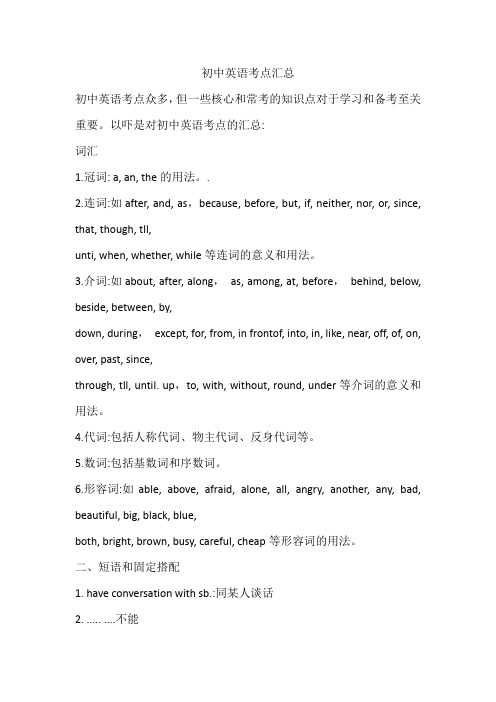
初中英语考点汇总初中英语考点众多,但一些核心和常考的知识点对于学习和备考至关重要。
以吓是对初中英语考点的汇总:词汇1.冠词: a, an, the的用法。
.2.连词:如after, and, as,because, before, but, if, neither, nor, or, since, that, though, tll,unti, when, whether, while等连词的意义和用法。
3.介词:如about, after, along,as, among, at, before,behind, below, beside, between, by,down, during,except, for, from, in frontof, into, in, like, near, off, of, on, over, past, since,through, tll, until. up,to, with, without, round, under等介词的意义和用法。
4.代词:包括人称代词、物主代词、反身代词等。
5.数词:包括基数词和序数词。
6.形容词:如able, above, afraid, alone, all, angry, another, any, bad, beautiful, big, black, blue,both, bright, brown, busy, careful, cheap等形容词的用法。
二、短语和固定搭配1. have conversation with sb.:同某人谈话2. ..... ....不能3. the secret t.. ..的秘诀4. be afraid of doing sth./ be afraid to do sth.:害怕做某事5. lookup:查阋6. repeat outloud:大声跟读7. make mistakes in: ..方面犯错误8. cnc...th.. .把....连接联系起来9. get bored:感到厌烦10. be stressed out:焦虑不安的11. pay attentionto:注意/关注12. depend on:取决于/依靠13. the ability to do sth:做某事的能力14. by + doing:通...方式15. talk about:谈论/议论/讨论16. no..at all: 一点也不/根本不17. be/get excited about sth.: ..感到兴奋18. end up doing sth:终止做某事/结束做某事19. firstofall:首先20. also:也(用于肯定句)。
初中英语中考考点词汇精讲(共10个)

中考英语考点词汇精讲1.grow upgrow up意为“长大;成熟;成长”。
例如:I grew up in Beijing.我是在北京长大的。
I want to be a football player when I grow up.我长大后相当一名足球运动员。
【拓展】(1)grow into意为“长大成为”。
例如:Mary grew into a beautiful girl.玛丽长成了一个漂亮的姑娘。
(2)grow还有“种植;增长”的意思。
例如:The farm grows all kinds of crops, such as rice, wheat and cotton.这个农场种植各种各样的庄稼。
例如:稻谷、小麦和棉花。
The population of the world is growing faster and faster.世界人口增加得越来越快。
2.make suremake sure=be sure,意思是“确信”,它的后面可以跟that(可省略)引导的宾语从句、动词不定式或of短语。
例如:I am sure of his guilt.我确定他有罪。
I am sure to help you tomorrow.我明天一定会帮你。
I am sure(that)he will achieve his goal.我确定他会实现目标的。
cationeducation是名词,意为“教育;教育学”。
例如:Everyone wants to have a good education.每人都想有一个良好的教育。
His lack of education is a disadvantage when he looks for a job.他缺少教育,这在找工作时是一个不利条件。
【拓展】educational是形容词,意为“教育的,有教育意义的”,常作定语。
例如:The staff should make sure the kids have an enjoyable and educational day.老师们应该确保孩子们度过愉快而有教育意义的一天。
初中英语考点梳理
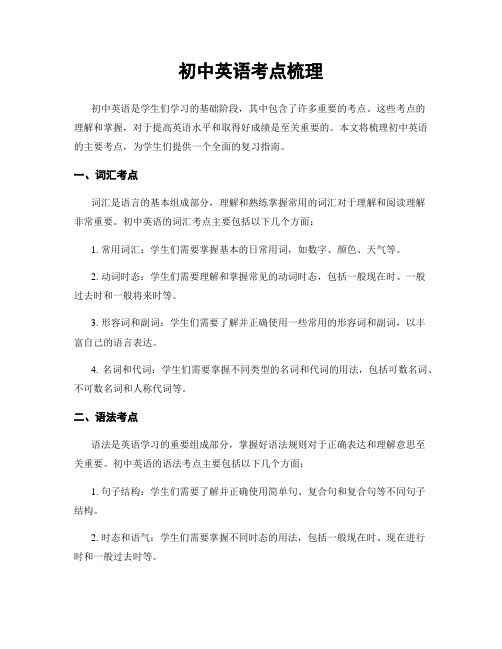
初中英语考点梳理初中英语是学生们学习的基础阶段,其中包含了许多重要的考点。
这些考点的理解和掌握,对于提高英语水平和取得好成绩是至关重要的。
本文将梳理初中英语的主要考点,为学生们提供一个全面的复习指南。
一、词汇考点词汇是语言的基本组成部分,理解和熟练掌握常用的词汇对于理解和阅读理解非常重要。
初中英语的词汇考点主要包括以下几个方面:1. 常用词汇:学生们需要掌握基本的日常用词,如数字、颜色、天气等。
2. 动词时态:学生们需要理解和掌握常见的动词时态,包括一般现在时、一般过去时和一般将来时等。
3. 形容词和副词:学生们需要了解并正确使用一些常用的形容词和副词,以丰富自己的语言表达。
4. 名词和代词:学生们需要掌握不同类型的名词和代词的用法,包括可数名词、不可数名词和人称代词等。
二、语法考点语法是英语学习的重要组成部分,掌握好语法规则对于正确表达和理解意思至关重要。
初中英语的语法考点主要包括以下几个方面:1. 句子结构:学生们需要了解并正确使用简单句、复合句和复合句等不同句子结构。
2. 时态和语气:学生们需要掌握不同时态的用法,包括一般现在时、现在进行时和一般过去时等。
3. 从句和连接词:学生们需要理解并正确使用宾语从句、状语从句和主语从句等不同类型的从句,以及连接词的使用。
4. 词性和句子成分:学生们需要理解并正确辨别名词、动词、形容词和副词等不同词性的词汇,以及句子中不同成分的作用。
三、阅读理解考点阅读理解是英语考试中最重要的部分之一,通过阅读理解能力的提高,学生们可以更好地理解文章的意思并准确回答问题。
初中英语的阅读理解考点主要包括以下几个方面:1. 主旨理解:学生们需要根据文章的标题、段落开头和结尾等线索,准确把握文章的主题和中心思想。
2. 细节理解:学生们需要仔细阅读文章,并能够根据具体细节回答问题,包括人物、地点、事件等细节。
3. 推理判断:学生们需要根据文章内容进行推理和判断,理解作者的意图和观点。
初中英语中考考点大汇总
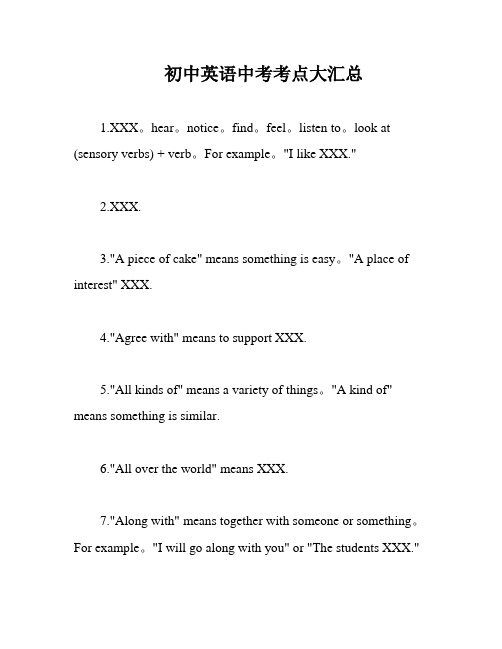
初中英语中考考点大汇总1.XXX。
hear。
notice。
find。
feel。
listen to。
look at (sensory verbs) + verb。
For example。
"I like XXX."2.XXX.3."A piece of cake" means something is easy。
"A place of interest" XXX.4."Agree with" means to support XXX.5."All kinds of" means a variety of things。
"A kind of" means something is similar.6."All over the world" means XXX.7."Along with" means together with someone or something。
For example。
"I will go along with you" or "The students XXX."8."XXX.9."As you can see" means that someone is already aware of something.10."Ask for" means to request something directly。
For example。
"Can I ask you for my book?"11."Ask someone for something" means to request something from XXX.12."Ask someone to do something" means to request that someone do something。
初中英语2024届中考高频语法考点整理
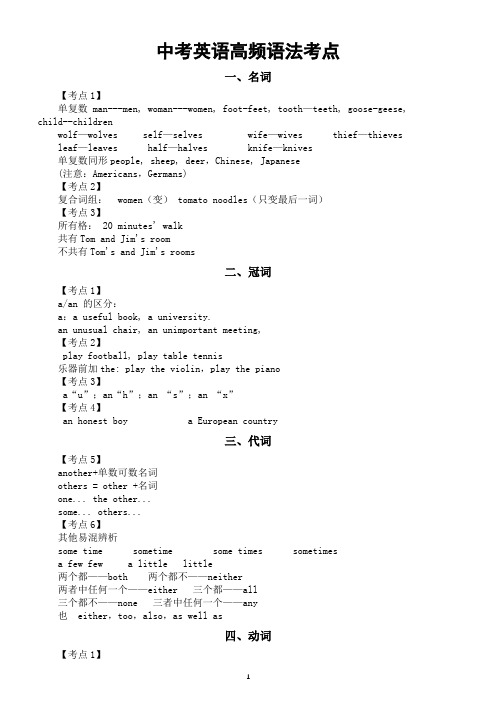
中考英语高频语法考点一、名词【考点1】单复数 man---men, woman---women, foot-feet, tooth—teeth, goose-geese, child--childrenwolf—wolves self—selves wife—wives thief—thieves leaf—leaves half—halves knife—knives单复数同形people, sheep, deer,Chinese, Japanese(注意:Americans,Germans)【考点2】复合词组:women(变) tomato noodles(只变最后一词)【考点3】所有格: 20 minutes' walk共有Tom and Jim's room不共有Tom's and Jim's rooms二、冠词【考点1】a/an 的区分:a:a useful book, a university.an unusual chair, an unimportant meeting,【考点2】play football, play table tennis乐器前加the: play the violin,play the piano【考点3】a“u”;an“h”;an “s”;an “x”【考点4】an honest boy a European country三、代词【考点5】another+单数可数名词others = other +名词one... the other...some... others...【考点6】其他易混辨析some time sometime some times sometimesa few few a little little两个都——both 两个都不——neither两者中任何一个——either 三个都——all三个都不——none 三者中任何一个——any也either,too,also,as well as四、动词【考点1】时态从句与主句时态一致He said he ﹏﹏﹏(be)there for an hour.He said the moon ﹏﹏﹏(run) around the earth.(错误,应改为一般现在时态) 2)条件状语从句:主将从现I don't know if he will come tomorrow. If he comes, I will call you.I will ring you as soon as I finish my work.I won’t go out until my homework is done.【考点2】主谓一致:谓语动词跟着主语发生变化就近原则:There be 句型Eith er …or…Neither...nor...,not only...but also..就远原则:with, as well as; including;except等五、连词1、并列连词:and / but / or / both...andeither...or / neither..nor / not only...but also2、宾语从句:(1)陈述语序(2)时态(主过从过)(3)引导词(根据句意选择)3、定语从句:判断从句是否缺主语/宾语,缺→关系代词;不→缺关系副词先行词指人:who、that、whom指物:that、which所属关系:whose4、状语从句:(1)If / Unless 条件状语从句:主将从现(主将从现还有)as soon as、when(2)when / while时间状语从句:过去进行时not...until直到....才.....(3)so...that because/so although/but六、介词【考点1】介词搭配talk abouton purposeby accidentbe famous forbe good at【考点2】时间介词on(天); in(时段); at (时刻)【考点3】表伴随with / without ,或doingShe is a girl with long hair.She is a girl wearing a new dress.【考点4】表方式by bike,on foot 没有冠词“a”或名词复数speak in Englishwrite in ink【考点5】介词(不加the)+名词at table 在桌旁,且在吃饭(两层意思)at the table 在桌旁,具体干什么不清楚七、形容词、副词【考点1】同级as 原形as / not as (so)... as...This food isn't so delicious asthat food.【考点2】修饰比较级的四个词:much, a little, even, farHe is much taller than Tom.最高级典型标志词:in , of , among【考点3】比较级、最高级的不规则变化:口诀:两病两多并两好,距离老远少迟到bad/ill : worse worstmuch/many : more mostlittle :less leastgood/well : better bestfar : farther farthestfurther furthestold : older oldestelder eldest【考点4】特殊句型:比较级 and 比较级......“越来越......”more and more 越来…He is growing taller and taller.The +比较级,the +比较级...“越......越......”The sooner you come, the earlier we would arrive.She can't be more beautiful!(她漂亮极了。
初中英语考点总结
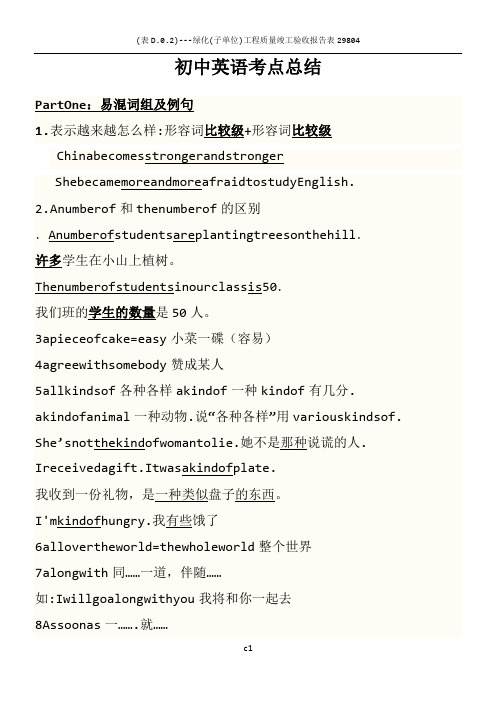
初中英语考点总结9asyoucansee你是知道的10.askforhelp……求助asksomebodyforsomething向某人什么asksomebodytodosomething要求某人做某事asksomebodynottodosomething叫某人不要做某事11Sheis too young to gotoschool.Sheis so young that she can’t gotoschool.Sheis oldenough togoschool.enoughwater12.WhenIheardthat excitingnews,I was excited. This film is boring,I get bored.13attheageof在……岁时IamsixteenIamattheageofsixteen14atthebeginningof…………的起初;……的开始15attheendof+地点/+时间最后;尽头;末尾eg:Attheendoftheday16atthistimeofyear在每年的这个时候17be/feelconfidentofsomethingIam/feelconfidentofmyspokenEnglish. IfeelconfidentthatIcanpassthetest18be+doing表:1现在进行时2将来时19beableto(+v原)=can(+v原)能够……(可互换)eg:SheisabletosingShecansing20willbeabletohas\havebeenableto(不可互换)Iwillbeabletosupportmyfamily.Hecould n’tbeabadman21beafraidtodosomething(beafraidofsomething)如:I'mafraidtogooutatnightI'mafraidofdog22beallowedtodo被允许做什么I'mallowedtowatchTV IshouldbeallowedtowatchTV应该被允许(含有情态动词的被动语态)23beangrywithsomebodyDon'tbeangrywithme.24beangrywith(at)sbfordoingsth为什么而生某人的气25beas…原级…aseg:Sheisastallasme她和我一样高26beashamedto羞于做某事羞于成为Don’tbeashamedtobeawaiter27beawayfrom,befarawayfrom,befarfrom有具体数字时不能用far:Myhomeis two kilometersawayfrommyschool. befaraway和befarfrom可以互换。
初中英语题型和考点

初中英语题型和考点
初中英语题型和考点如下:
一、听力部分
1.听力理解概述:主要考查学生对所听语言材料的理解能力。
听力在整个的语
言交际活动中约占50%左右,可见听力在英语中的重要性。
2.题型:主要有选图片、快速应答、对话、短文和表格等。
3.考点:主要集中在学生对语言基础知识的掌握程度,以及他们的反应速度。
为了取得听力部分的高分,学生应注重日常生活中听力的不断积累,学会精听和泛听的有效结合,以及用英语思维,排除母语的干扰。
二、阅读理解
1.题型:主要包括主旨大意题、细节理解题、推理判断题、词义猜测题等。
2.考点:主要测试学生对文章的理解能力,包括对文章的主旨、细节、作者意
图等的理解。
解题时,学生需要统览全篇,抓住文章的中心大意,捕捉主题句,同时也需要注意文章的逻辑关系。
三、完形填空
1.题型:主要考查学生在理解文章的基础上,对词汇和语法的掌握情况。
2.考点:包括词汇辨析、固定搭配、语法结构等。
学生需要通读全文,了解文
章的大意和结构,然后结合上下文进行选词填空。
四、语法填空
1.题型:主要考查学生对语法知识的掌握情况,包括词汇的适当形式、短语搭
配、句型结构等。
2.考点:集中在词法、句法等基础知识的运用上。
学生需要熟练掌握各种语法
规则,并能根据语境进行适当的变形。
五、书面表达
1.题型:主要包括命题作文、看图写话、应用文写作等。
2.考点:主要测试学生的书面表达能力,包括对文章结构的安排、内容的阐述
以及语言的准确性等。
在备考时,学生需要多积累词汇和句型,并练习各种题材的写作。
人教版初中英语中考80个重要考点
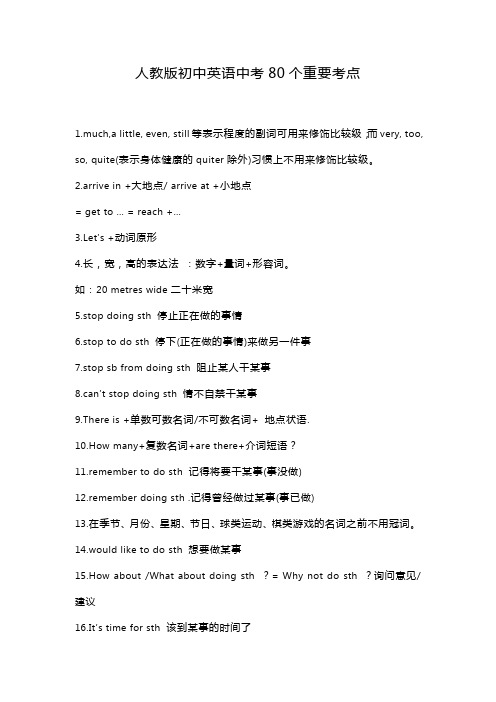
人教版初中英语中考80个重要考点1.much,a little, even, still等表示程度的副词可用来修饰比较级;而very, too, so, quite(表示身体健康的quiter除外)习惯上不用来修饰比较级。
2.arrive in +大地点/ arrive at +小地点= get to … = reach +…3.Let’s +动词原形4.长,宽,高的表达法:数字+量词+形容词。
如:20 metres wide二十米宽5.stop doing sth 停止正在做的事情6.stop to do sth 停下(正在做的事情)来做另一件事7.stop sb from doing sth 阻止某人干某事8.can’t stop doing sth 情不自禁干某事9.There is +单数可数名词/不可数名词+ 地点状语.10.How many+复数名词+are there+介词短语?11.remember to do sth 记得将要干某事(事没做)12.remember doing sth .记得曾经做过某事(事已做)13.在季节、月份、星期、节日、球类运动、棋类游戏的名词之前不用冠词。
14.would like to do sth 想要做某事15.How about /What about doing sth ?= Why not do sth ?询问意见/建议16.It’s time for sth 该到某事的时间了17.It’s time to do sth该到干某事的时间了18.have fun doing sth 很高兴干某事19.make sb do sth 使某人干某事20.can’t afford to do sth 没有足够多钱干某事21.can’t stand doing sth 不能忍受干某事22.mind doing sth 介意干某事23.try to do sth 尽力干某事24.finish doing sth 结束干某事25.decide to do sth 决定干某事26.plan to do sth 计划干某事27.It +takes +sb.+时间+to do sth28.sb. +spend +时间+on sth (in doing sth )29.Can you do sth ?你可以做,,,吗30.be busy doing sth 忙于干某事31.called = named = with the name (of)32.at the age of = when sb was/ were ….33.because of 后面接名词、代词、名词性短语、what从句34.keep doing sth . 表示不间断地持续做某事或一直做某事。
初中初三中考英语-容易被疏忽的考点
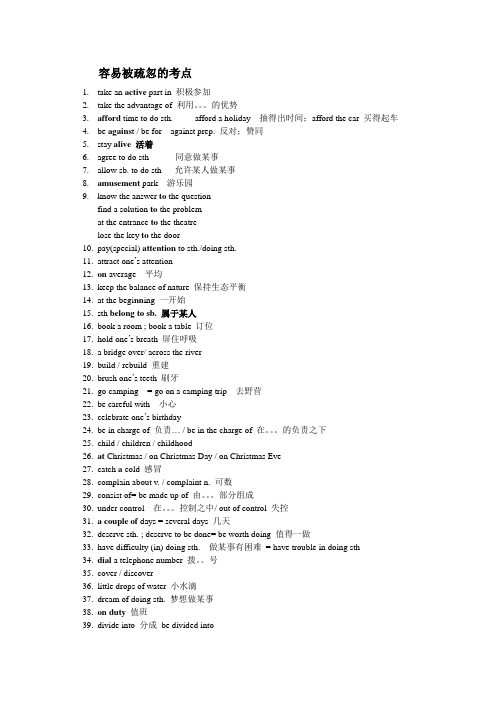
容易被疏忽的考点1.take an active part in 积极参加2.take the advantage of 利用。
的优势3.afford time to do sth. afford a holiday 抽得出时间;afford the car 买得起车4.be agains t / be for against prep. 反对;赞同5.stay alive 活着6.agree to do sth 同意做某事7.allow sb. to do sth 允许某人做某事8.amusement park 游乐园9.know the answer to the questionfind a solution to the problemat the entrance to the theatrelose the key to the door10.pay(special) attention to sth./doing sth.11.attract one’s attention12.on average 平均13.keep the balance of nature 保持生态平衡14.at the begi nn ing 一开始15.sth belong to sb. 属于某人16.book a room ; book a table 订位17.hold one’s breath 屏住呼吸18.a bridge over/ across the river19.build / rebuild 重建20.brush one’s teeth 刷牙21.go camping = go on a camping trip 去野营22.be careful with 小心23.celebrate one’s birthday24.be in charge of 负责… / be in the charge of 在。
初中英语中考考点大汇总
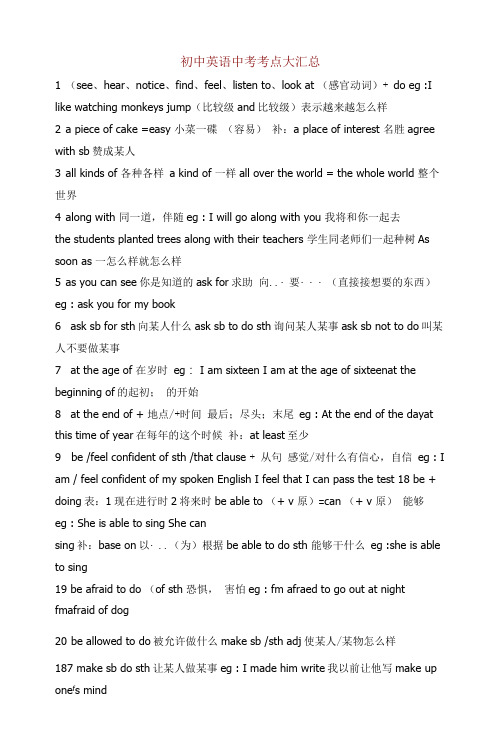
初中英语中考考点大汇总1(see、hear、notice、find、feel、listen to、look at (感官动词)+ do eg :I like watching monkeys jump(比较级and比较级)表示越来越怎么样2a piece of cake =easy 小菜一碟(容易)补:a place of interest 名胜agree with sb赞成某人3all kinds of 各种各样a kind of 一样all over the world = the whole world 整个世界4along with 同一道,伴随eg : I will go along with you 我将和你一起去the students planted trees along with their teachers 学生同老师们一起种树As soon as 一怎么样就怎么样5as you can see你是知道的ask for求助向..・要・・・(直接接想要的东西)eg : ask you for my book6ask sb for sth向某人什么ask sb to do sth询问某人某事ask sb not to do叫某人不要做某事7at the age of 在岁时eg: I am sixteen I am at the age of sixteenat the beginning of的起初;的开始8at the end of + 地点/+时间最后;尽头;末尾eg : At the end of the dayat this time of year在每年的这个时候补:at least至少9be /feel confident of sth /that clause + 从句感觉/对什么有信心,自信eg : I am / feel confident of my spoken English I feel that I can pass the test 18 be + doing表:1现在进行时2将来时be able to (+ v 原)=can (+ v 原)能够eg : She is able to sing She cansing补:base on以・..(为)根据be able to do sth 能够干什么eg :she is able to sing19be afraid to do (of sth 恐惧,害怕eg : fm afraed to go out at night fmafraid of dog20be allowed to do被允许做什么make sb /sth adj使某人/某物怎么样187make sb do sth让某人做某事eg : I made him write我以前让他写make up one f s mind188make...difference to...189mind sb to do mind one's doing 介意做什么most 十名most of + 代190much too + 形容词must be 一定191need +名词need sb do sth需要某人做某事192need to do (实义动词)need do (情态动词)no /neithr of hate to do no /neithr of hate doing193no +名词not anymore = no more 再也不eg: He didn't cry any more He cried nomore他再也不哭not...(形、副)at all eg: He's not tall at all she doesn't junp far at all194not...at all 一点都不not only... but also...不但…而且…not...either 表否定,也不eg : I don't japanse either I don't have sister; either我也没有姐姐195not...until 直到才eg: I didn't sleep until my mother came back The child didn't stop crying until I give her sugar196offer / provide sb with sth 给某人提供offer sb sth ( offer sth to sb 提供什么东西给某人eg : I offer you water (I offer water to you我给你提供水197on one's way to...在谁去那的路上on the one hand 一方面on the other hand 另一方面198on the phone = over the phone 用电话交谈on time 准时in time 及时199one day =some day = someday 一天,有一天one of +可数名词的复数形式200one to another 一个到另一个over and over agin 一遍又一遍的eg : He cleaned the floor over and over agin201part-time job 兼职工作fall-time job 全职工作pay for...付......钱pay the bill 开钱,付钱202please +do pull...up from...把..・从・..拉上来please help yourself203pleased with sbpool into = pore into204practice +doing 练习做某事prefer sth to sth 相对更喜欢eg : I preferphysics to chemisty 在物理和化学中,我更喜欢物理prefer doing to sth更喜欢去做..,不愿意去做.・・eg: He prefers riding a bike todiving他更喜欢骑自行车,不开小车prefer to do sth rather than do sth 宁愿做…也不愿eg: My unde prefers to buy a now car rather than repaiv the used one 我叔叔更喜欢买新的车,也不去修旧车prefer sb not to do sth 更愿意...eg: I prefer her not to come 我不喜欢她不来205pretend to do sth 装着去做什么pretend that 从句eg : The two cheats pretended to be working very hard 这两个骗子装着努力工作He pretended that he did not know the answer 他装着不知道答案rather...than 宁可也不eg : I would rather be a doctor than a teacher 我愿肯当医生,也不当老师He likes dogs rather than cats 他喜欢狗,不喜欢猫225 regard...as 把当作eg: Please give my best regards to your family请带我向你的家人我最好的问候I regard you as my friend我把你当作我的朋友He shows little regard for others 他不爱关心别人226 remid sb about sth提醒某人什么事remid sb to do sth提醒某人做某事eg : he remids me about cooking (he remids me to cook 他提醒我做饭227 remid sb of sth使某人想起什么eg : the pictures remind me of my school days 这照片使我想起了我的学校the words that (which) the teacher talke to remind me of my mother228 return sth to sb还什么东西给某人229 say to oneself 对自己说230 say to sb对某人说231 sb spend somemoney on sth 花了多少钱在某事上232 sb spend sometime with sb 花了多少时间陪谁233 sb spend sometime(in) doing sth 花了多少时间做某事234 sb with sb +is sband sb +are235 see sb do看见某人做过某事see sb doing看见某人正在做某事236 seem to do/be +adj 显得怎么样eg : You seem to be tired You seem to be happy it seem that237 send +sb sth送给某人某物238 send…to…把什么寄到哪里去?239 shock 使震惊eg : Oh , IVs only you ! You give me a shock 啊,是你呀!吓我一跳show sb sth 向某人展示某物 eg : I show her the book.240show sb sth = show sth to sb 拿什么东西给某人看eg: Show me your pen Show your pen to meshow sth to sb 向某人展示某物eg : I show the book to her.241some...others... 一些另一些start...with...从开始begin...with...从开始242stay away from 远离start doing sth/start to dosth 开始做某事eg : We1 re told to stay away from the animals whe visiting the zoo 当我们参观zoo时、我们要远离动物If you want to lose weight you'd better stay auay from the sweet food 徒工你想减肥,你最好远离甜食stop doing停下正在做的事243stop sb from doing sth阻止某人做某事stop sb(from) doing阻止某人做某事244stop to do停下正在做的事去做下一件事such +名这样,这种245suit sb适合某人surprise sb 使某人惊奇to one's surprise 令某人惊奇246take classes 上课take one's temperature 给某人量体温take sb to 把某人带去eg : I take you to the hospital247take walks = take a walk = go for a walk 散步①talk to 对谁说eg : I talk to you ② talk with 和谁说eg : I talk with him③ talk of 谈到eg : we talked of you ④ talk about 谈论关于257 talk with sb和某人说话258 teach sb sth教某人做某事tell sb do sth告诉某人做某事259tell sb sth tell sb that 丛句tell sb not to do sth tell a storytell sb sth告诉某人某事260tell sb to do sth告诉某人做什么tell sb not to do sth告诉某人不要做什么tell...from... thank to 幸亏,由于261thank you for +doing thank sb for sth 因某事而感谢某人the same + 名词(doing)+asthe more... the more...越..,就越..・262the same...(名)...as as...(adj adv)...as 相同the way to do sth=the way of doing sth 做某方面的方法the day before yesterday前天the way to +地方去哪的路e g : Do you know the way to learn EnglishDo you know the way of learning English263the way to…(地点)到哪的路269 too...to...太怎样而不能adj +enough to 足够..・能・・.so...that +丛句太… 所以…(such+名词…that+从句)eg: He is too young to go to school = He is so young that he cant go to school He is old enough to go to school = He is so old that he can go to school270 transalteinto 把什么翻译成什么eg : Trasalte English into Chinese271 travel with sb和某人去旅游272 try one's best to do sth尽某人最大的努力去做某事eg: I w川try my best to learn English well273 try to do sth想干什么,但没成功try doing sth想干什么,已经做过了eg : He tried to climb他想爬上去,但没成功He tried climbing他想爬上去,已经做过了274 try…试衣服have a try试一下275 turn down 开小 <—turn up 开大276 turn off 关上—turn on 打开open 拆开277 upside down 但J着nuless=if not278 visit to...参观某个地方279 wait for sb 等某人280 wait for sb to do sth 等某人做什么wait for sb 等某人wait for sometime 等多少间eg : Would you please wait for me to get ready 等我准备好,好吗?Let's wait for the rain to stop 让我们等雨停吧281 wake sb up把某人叫醒282 want to do sth想做某事283 watch sb do sth观看某人做某事补:wear out把…穿坏284 welcome to +…(地方)欢迎到285 what about +n /doing eg : what about an apple286 what if如果怎么办What if +句子eg : What if it is true ?如果是真的怎么办?What if aliens should come to the earth假如外星人来到地球怎么办?287 what they will do = what to do288 What's the matter ? = WhaVs the trouble ? = Whafs wrong ?有什么困难?289 while +延续性动词290 why don't you do = why not do291 will you please do will you please not do292 with one's best = with the help of sb 在某人的帮助下293 with the help of sb 在某人的帮助下with one f s help294 work at…在某处工作295 work with sb和某人一起工作296 would like sth /to do sth eg : I would like to go to LuZhou297 would you please +do 298 yet :至今,用在否定句中299 you'd better do最好做某事=you'd better not do最好不要做某事300不定式+v(原)301联系动词(taste吃起来/sound听起来/look看起来/semll闻起来)+adj302名词、副词、形容词修饰enongh时,形容词放在之前,名词副词放在之后303太多too much +不可数too many +可数much too相当于very ,修饰形容词304向宾语提问:Whom 305向地点提问:Where 306向方式提问:How307向价格和不可数名词提问:How much 308向可数名词提问:How many309向频率提问:How often 310向时间段提问:How long311向时间提问:what time/when 312向物主代词提问:Whose313向职业提问:what do/does……do 314向主语提问:Who315在将来时中,……以后(用in, 一般时态中,……以后(用after316.It's time for sth.该到做某事的时间了 . It's time to do sth.(Its time for sb. todo sth)该到(某人)做某事的时间了.317.can't wait to do sth.迫不及待地要求做某事.318.ask (tell)sb. (not )to do sth .请(告诉)某人(不)做某事.319.make/let sb. to do sth.让某人做某事.320.hear/see/sb. do sth听见/看见某人做某事.321.had better(not )do sth 最好不做某事.322.Its better to do sth 最好做某事It's best to do sth 最好做某事323.enjoy喜欢做某事finish结束做某事324.keep继续做某事keep on doing sth.继续做某事325.carry on继续做某事go on继续做某事326.feel like喜欢做某事stop to do sth与stop doing sth停下来去做某事(与)停止做某事.327.forget/remember to do 与forget/「emember doing sth,忘t己/,己得去做某事(与)忘记/记得曾经做过事.328.keep(precent,stop)sb. from doing sth 阻止/防止/阻栏栽人做某事prefer....to喜欢・・・,.胜过329.prefer to do sth. rather than do ath,宁愿做某事,而不原做某事.ed to do sth.过去常常做某事.331.What's wong with? .・…出了问题(事)?332.have nothing to do with.・...与...一无关be busy doing sth .在忙于做某事333.tooto.・・・・太・・・・・・以致知于不・・・・・・so ......that.....如此.....以致知于不......334.such.・・・.that如此以致知于不It take sb. some time to do sth ,某人做某事用了一些时间.335.spend .・・・,on sth.(doing sth)花钱/时间做某事.336.pay.….for sth.花费(钱)买某物.337.What /how about……?…,…怎么样(好吗)?338.would like to do sth .想要/愿意做某事..339.I don't think that 我认为不・・・,,Why not do sth.? Why don't you do sth ・为什么不做某事呢340.What do you mean by.…你.…是什么意思?341.What do you think of (How do you like .・・.)你认为・・.,怎么样?342.Mike enjoys collecting stamps . So do L迈克喜欢集邮,我也也喜欢.343.The more, the better,越多越剧好.344.Thanks for doing sth•谢谢你做了某事.345.It is said that..… 据说…356,感官动词see, watch, observe, notice, look at, hear; listen to, smell, taste, feel + do 表示动作的完整性,真实性;+doing表示动作的连续性,进行性,I saw him work in the garden yesterday,昨天我看见他在花园里干活了。
初中英语常见考点归纳
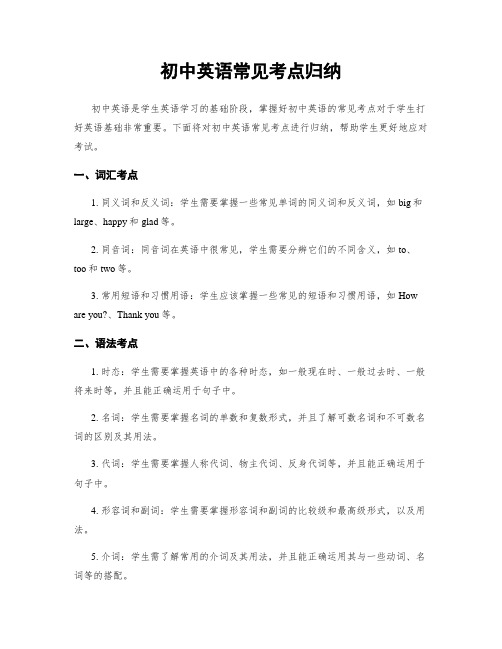
初中英语常见考点归纳初中英语是学生英语学习的基础阶段,掌握好初中英语的常见考点对于学生打好英语基础非常重要。
下面将对初中英语常见考点进行归纳,帮助学生更好地应对考试。
一、词汇考点1. 同义词和反义词:学生需要掌握一些常见单词的同义词和反义词,如big和large、happy和glad等。
2. 同音词:同音词在英语中很常见,学生需要分辨它们的不同含义,如to、too和two等。
3. 常用短语和习惯用语:学生应该掌握一些常见的短语和习惯用语,如How are you?、Thank you等。
二、语法考点1. 时态:学生需要掌握英语中的各种时态,如一般现在时、一般过去时、一般将来时等,并且能正确运用于句子中。
2. 名词:学生需要掌握名词的单数和复数形式,并且了解可数名词和不可数名词的区别及其用法。
3. 代词:学生需要掌握人称代词、物主代词、反身代词等,并且能正确运用于句子中。
4. 形容词和副词:学生需要掌握形容词和副词的比较级和最高级形式,以及用法。
5. 介词:学生需了解常用的介词及其用法,并且能正确运用其与一些动词、名词等的搭配。
6. 从句:学生需要掌握主语从句、宾语从句、定语从句和状语从句的基本结构和用法。
三、阅读考点1. 主旨大意:学生需要通过阅读理解文章的全文大意和中心思想。
2. 细节理解:学生需要从文章中找出相关的细节信息,并且理解其含义。
3. 推理判断:学生需要根据文章中的线索,进行推理判断,理解作者的意图和观点。
4. 表达方式:学生需要分析文章中的语言表达方式,如比喻、比较、举例等,以便更好地理解文章。
5. 文章结构:学生需要理解文章的结构,如开头、发展、结尾等。
四、听力考点1. 听数字和时间:学生需要能准确听懂和理解听力材料中出现的数字和时间信息。
2. 听问句和回答:学生需要理解和回答听力材料中的问句和回答。
3. 听对话和短文:学生需要理解和回答听力材料中的对话和短文,并提取关键信息。
初中英语考点总结(精选11篇)
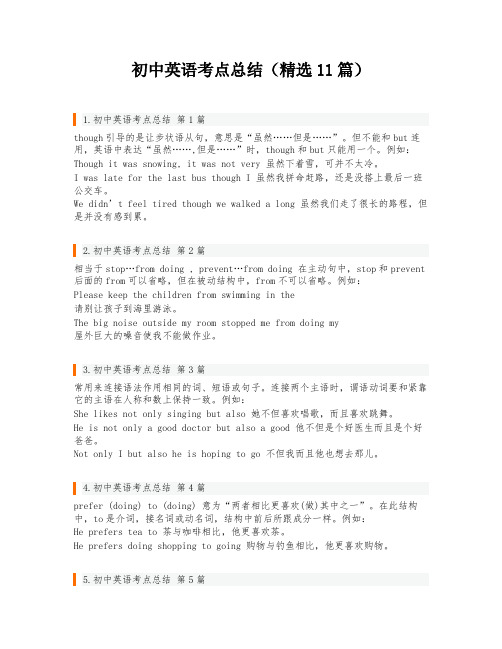
初中英语考点总结(精选11篇)1.初中英语考点总结第1篇though引导的是让步状语从句,意思是“虽然……但是……”。
但不能和but连用,英语中表达“虽然……,但是……”时,though和but只能用一个。
例如:Though it was snowing, it was not very 虽然下着雪,可并不太冷。
I was late for the last bus though I 虽然我拼命赶路,还是没搭上最后一班公交车。
We didn’t feel tired though we walked a long 虽然我们走了很长的路程,但是并没有感到累。
2.初中英语考点总结第2篇相当于stop…from doing , prevent…from doing 在主动句中,stop和prevent 后面的from可以省略,但在被动结构中,from不可以省略。
例如:Please keep the children from swimming in the请别让孩子到海里游泳。
The big noise outside my room stopped me from doing my屋外巨大的噪音使我不能做作业。
3.初中英语考点总结第3篇常用来连接语法作用相同的词、短语或句子。
连接两个主语时,谓语动词要和紧靠它的主语在人称和数上保持一致。
例如:She likes not only singing but also 她不但喜欢唱歌,而且喜欢跳舞。
He is not only a good doctor but also a good 他不但是个好医生而且是个好爸爸。
Not only I but also he is hoping to go 不但我而且他也想去那儿。
4.初中英语考点总结第4篇prefer (doing) to (doing) 意为“两者相比更喜欢(做)其中之一”。
在此结构中,to是介词,接名词或动名词,结构中前后所跟成分一样。
初中英语重点考点汇总
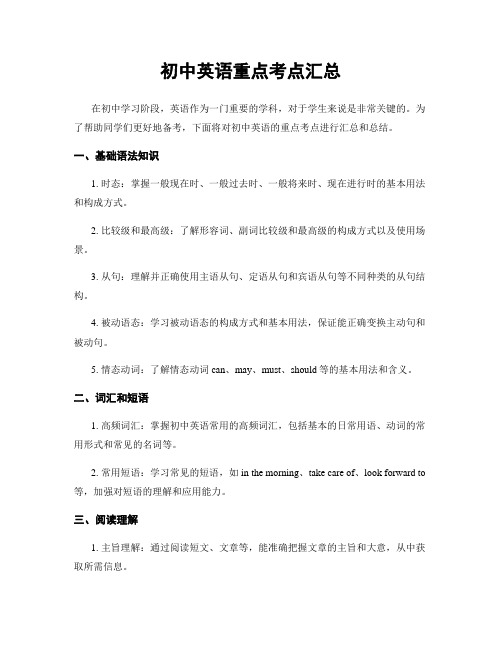
初中英语重点考点汇总在初中学习阶段,英语作为一门重要的学科,对于学生来说是非常关键的。
为了帮助同学们更好地备考,下面将对初中英语的重点考点进行汇总和总结。
一、基础语法知识1. 时态:掌握一般现在时、一般过去时、一般将来时、现在进行时的基本用法和构成方式。
2. 比较级和最高级:了解形容词、副词比较级和最高级的构成方式以及使用场景。
3. 从句:理解并正确使用主语从句、定语从句和宾语从句等不同种类的从句结构。
4. 被动语态:学习被动语态的构成方式和基本用法,保证能正确变换主动句和被动句。
5. 情态动词:了解情态动词can、may、must、should等的基本用法和含义。
二、词汇和短语1. 高频词汇:掌握初中英语常用的高频词汇,包括基本的日常用语、动词的常用形式和常见的名词等。
2. 常用短语:学习常见的短语,如in the morning、take care of、look forward to 等,加强对短语的理解和应用能力。
三、阅读理解1. 主旨理解:通过阅读短文、文章等,能准确把握文章的主旨和大意,从中获取所需信息。
2. 细节理解:能够根据文章中的细节信息回答相关问题,了解文章中的具体细节含义。
3. 推理判断:通过上下文的暗示和逻辑推理,对文章中的信息进行分析和判断,得出相关结论。
4. 表达态度:理解文章中的作者态度,分析文章意图和情感色彩。
四、写作技巧1. 作文结构:掌握基本的作文结构,包括开头、中间和结尾等部分,合理安排内容,使作文结构完整。
2. 句子衔接:使用适当的连接词、过渡词等,使句子之间的衔接更加流畅自然。
3. 语法准确:注意语法的正确运用,尽量避免语法错误,使用正确的时态、主谓一致和被动语态等。
4. 词汇丰富:运用丰富的词汇和表达方式,使作文更加生动有趣。
五、口语交际1. 日常用语:掌握常见的日常用语,如问候、道歉、表达意见等,提高口头交流的能力。
2. 语音语调:注意语音语调的准确运用,正确发音和使用语调,使口语表达更加地道。
初中中考英语知识点考点总结
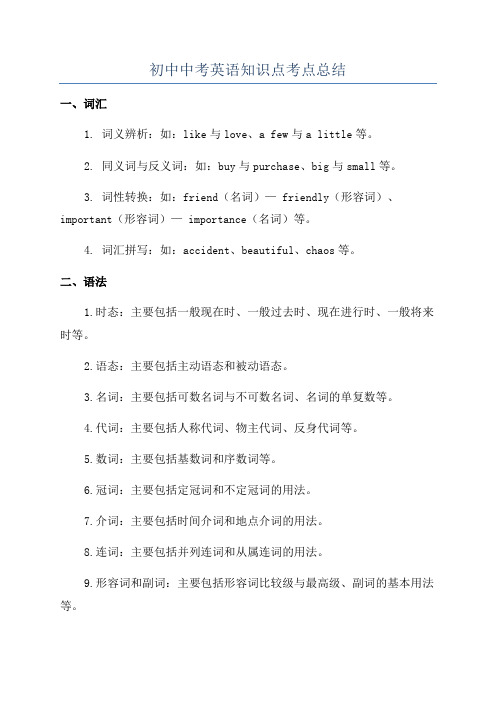
初中中考英语知识点考点总结一、词汇1. 词义辨析:如:like与love、a few与a little等。
2. 同义词与反义词:如:buy与purchase、big与small等。
3. 词性转换:如:friend(名词)— friendly(形容词)、important(形容词)— importance(名词)等。
4. 词汇拼写:如:accident、beautiful、chaos等。
二、语法1.时态:主要包括一般现在时、一般过去时、现在进行时、一般将来时等。
2.语态:主要包括主动语态和被动语态。
3.名词:主要包括可数名词与不可数名词、名词的单复数等。
4.代词:主要包括人称代词、物主代词、反身代词等。
5.数词:主要包括基数词和序数词等。
6.冠词:主要包括定冠词和不定冠词的用法。
7.介词:主要包括时间介词和地点介词的用法。
8.连词:主要包括并列连词和从属连词的用法。
9.形容词和副词:主要包括形容词比较级与最高级、副词的基本用法等。
10.动词:主要包括动词的基本形式、动词的否定形式和疑问形式等。
11.句子成分:主要包括主语、谓语、宾语、表语、宾补等。
三、阅读理解1.主旨大意:通过阅读理解文章找出文章的主旨大意。
2.细节理解:通过阅读理解文章理解文章中的细节信息。
3.推理判断:通过阅读理解文章推理出一些信息。
4.阅读策略:通过对阅读理解文章的整体结构和段落结构的理解来解答问题。
5.文章类型:通过阅读理解文章分析文章的类型。
四、短语和固定搭配1. 动词短语:如:get up、take off、look after等。
2. 名词短语:如:a piece of cake、at first、by the way等。
3. 动宾搭配:如:do homework、take photos、make a decision等。
5. 副词短语:如:once a week、twice a month等。
五、写作技巧1.书信:主要包括信件的格式和常用写作句式。
初中英语2024届中考考点清单(代词+连词+形容词+数词+介词)
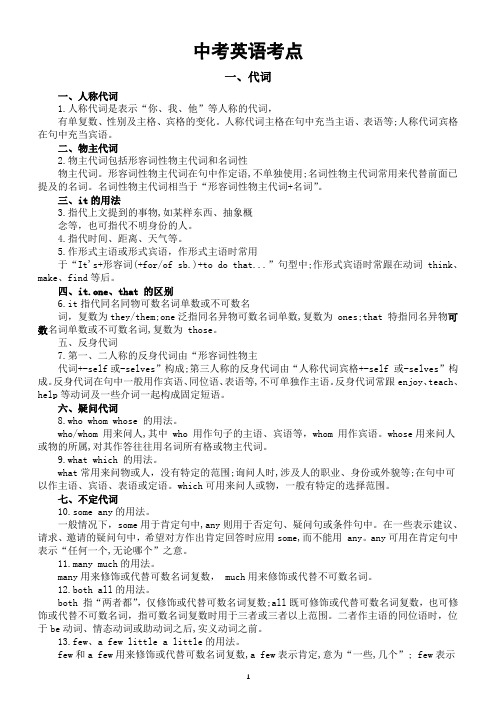
中考英语考点一、代词一、人称代词1.人称代词是表示“你、我、他”等人称的代词,有单复数、性别及主格、宾格的变化。
人称代词主格在句中充当主语、表语等;人称代词宾格在句中充当宾语。
二、物主代词2.物主代词包括形容词性物主代词和名词性物主代词。
形容词性物主代词在句中作定语,不单独使用;名词性物主代词常用来代替前面已提及的名词。
名词性物主代词相当于“形容词性物主代词+名词”。
三、it的用法3.指代上文提到的事物,如某样东西、抽象概念等,也可指代不明身份的人。
4.指代时间、距离、天气等。
5.作形式主语或形式宾语,作形式主语时常用于“It's+形容词(+for/of sb.)+to do that...”句型中;作形式宾语时常跟在动词 think、make、find等后。
四、it.one、that 的区别6.it指代同名同物可数名词单数或不可数名词,复数为they/them;one泛指同名异物可数名词单数,复数为 ones;that 特指同名异物可数名词单数或不可数名词,复数为 those。
五、反身代词7.第一、二人称的反身代词由“形容词性物主代词+-self或-selves”构成;第三人称的反身代词由“人称代词宾格+-self 或-selves”构成。
反身代词在句中一般用作宾语、同位语、表语等,不可单独作主语。
反身代词常跟enjoy、teach、help等动词及一些介词一起构成固定短语。
六、疑问代词8.who whom whose 的用法。
who/whom 用来问人,其中 who 用作句子的主语、宾语等,whom 用作宾语。
whose用来问人或物的所属,对其作答往往用名词所有格或物主代词。
9.what which 的用法。
what常用来问物或人,没有特定的范围;询问人时,涉及人的职业、身份或外貌等;在句中可以作主语、宾语、表语或定语。
which可用来问人或物,一般有特定的选择范围。
七、不定代词10.some any的用法。
_初中英语动词考点归纳

初中英语动词考点归纳一、+do+to do+doing动词ing形式1. keep doing sth. 坚持做某事2.hold on to doing sth. 坚持做某事3. practise doing sth. 练习做某事4. enjoy doing sth. 喜欢做某事5. finish doing sth. 完成做某事6. be afraid of doing sth. 害怕做某事7. be busy doing sth. 忙于做某事8. look forward to doing sth. 盼望做某事9. spend ... (in)doing sth. 花...做某事10. stop/keep/prevent …from doing sth. 阻止某人做某事11. thank sb for doing sth. 感谢某人做某事12. mind doing sth. 介意做某事13. can’t help doing sth. 情不自禁做某事14. have difficulty/problem/trouble doing sth. 做某事有困难15. instead of doing sth. 代替做某事16. pay attention to doing sth. 集中精力做某事17. suggest doing sth. 建议做某事18. It’s time for doing sth. 到该做某事的时间19.It’s time to do sth. 到该做某事的时间了20. be used to doing sth. 习惯做某事21.be used for doing sth. 被用来做某事22. allow doing sth. 允许做某事23. put off doing sth. 推迟做某事24. succeed in doing sth. 成功做某事25. end up doing sth. 以做某事结束26. give up doing sth. 放弃做某事二、不带to的动词不定式1. had better (not) do sth. 最好(不)做某事2.let sb do sth. 让某人做某事3.make/have sb. do sth. 使某人做某事三、动词to do形式1. It’s time to do sth. 该是做某事的时候了2. It takes sb. some time to do sth. 做某事花了某人时间3. encourage/invite/ sb. to do sth. 鼓励/邀请某人做某事4. It’s+ adj+ for sb. to do sth. 做某事对某人5.It’s + adj.+ of sb. to do sth. 某人做某事6. decide/wish/to do sth. 决定/希望做某事7. prefer to do rather than do sth. 宁愿做某事而不愿做某事8. can’t wait to do sth. 迫不及待做某事9. be afraid/ready/able to do sth. 害怕/准备/能够做某事10. refuse to do sth. 拒绝做某事11. warn sb. to do sth. 告诫某人做某事12. pretend to do sth. 假装做某事13. teach/learn to do sth. 教做某事、/学习做某事14. need to do sth. 需要做某事15. be willing to do sth. 愿意做某事16. try to do sth. 努力做某事17.try one’s best to do sth. 尽某人最大努力做某事18. agree to do sth. 同意做某事19. seem to do sth. 好像似乎做某事20. plan to do sth /make a plan to do sth. 计划做某事21. in order to do sth. 为了做某事22. have a chance to do sth. 有机会做某事23. be anxious to do sth. 渴望做某事24. afford to do sth. 支付得起做某事四、两个动词连用,表目的1. used to do sth. 过去常常做某事2.be used to do sth. 被用来做某事e sth. to do sth. 用某物做某事4. be supposed to do sth. 应该做某事5. allow sb to do sth. 允许某人做某事6.sb be allowed to do sth. 某人被允许做某事7. the best way is to do sth. 最好的方法是做某事8. the next step is to do sth.下一步是做某事9. have an opportunity to do sth. 有机会做某事10. the first thing is to do sth. 第一件事是做某事11. it’s best to do sth. 最好做某事12. it’s a good time to do sth. 这是做某事的最好时间13. be sure to do sth. 一定会做某事14. urge sb to do sth. 催促某人做某事15. order sb to do sth. 命令某人做某事16.offer to do sth. 主动提供做某事17. invite sb to do sth. 邀请某人做某事18. expect to do sth. 期望做某事19. volunteer to do sth. 志愿做某事20. it’s one’s duty to do sth. 做某事是某人的责任五、既带to的动词不定式又带ing形式1. stop to do/ doing sth. 停下来做另一件事/停止做某事2. forget to do/ doing sth. 忘记去做某事/忘记做过某事3. remember to do/doing sth. 记住去做某事/记得做过某事4. go on to do/doin sth. 继续做另一件事/继续做某事5. like to do/doing sth. 喜欢做某事6. love to do/doing sth. 喜欢做某事7. prefer to do/doing sth. 更喜欢做某事8. hate to do/doing sth. 讨厌做某事六、既带to的动词不定式又用现在分词用不带to的动词不定式强调动作的完成过程;用现在分词强调动作的进行状态。
初中英语教资考试知识点超详细考点总结.doc

第一部分语言知识与能力第一章英语语言知识二、语音(Speech Sounds)P781、语音分类发音方式发音部位VL - 清浊音(voiceless consonant) VD - 浊辅音(voiced consonant)2、音系学(phonology)P79(1)同化规则(assimilation Rule)progressive assimilation 顺同化(前面带偏后面)workedregressive assimilation 逆同化(后面带偏前面)newspaperreciprocal/double assimilation 互相同化 did you(2)音节(syllable) tea chi-na im-pos-si-ble重音(stress)声调(tone)(3)语音变化(vocal variety)liaison 连读 pick it upplosion 爆破音plosion loss 失去爆破 sit down ;incomplete plosion 不完全爆破 ask ed nasal plosion 鼻腔爆破 button ;lateral plosion 舌边爆破 little三、形态学(Morphology)1、morpheme 词素重点! P87(1)free morpheme 自由词素 dog ;bound morpheme 黏着词素 moonwalk(2)root 词根; affix 词缀(prefix 前缀、suffix 后缀); stem 词干friend-ships(3)inflectional affix 屈折词缀 -s,-ing,-ed不同形式(4)derivational affix 派生词缀改变词性和意义2、(1)inflection 屈折变化 -s,-ing,-ed不同形式(2)word-formation 词的形成:compounding 复合法 through-outderivation 派生法(prefixation 前缀化 suffixation 后缀化)il-logical-ly3、常见构词法P89invention 新创词 nylon ;blending 混成法 smoke+fog=smogclipping 截断法 advertisement=ad ;initialism 首字母连写词 WTOacronym 首字母拼音词 AIDS ;back-formation 逆构词法 editor--editanalogical creation 类似构词 work--wrought/workedtypes of borrowing 借词法:loanword/borrowing 借词 feast(法语中借来)loanblend 混合借词 Chinatown (本国加外来)loanshift 转移借词 bridge (借用意义)loan translation 翻译借词(从别种语言翻译而来)4、词义变化broadening 词义扩大 bird 小鸟--鸟类;narrowing 词义缩小 girl 年轻人--女孩meaning shift 词义转移;class shift 词性转换;folk etymology 俗词源(错多了成了对的)四、句法学(Syntax) P911、句法关系syntagmatic relation 组合关系(horizontal relation/chain relation)构成同一形式、序列或结构paradigmatic relation 聚合关系(vertical relation/choice relation)各要素可相互替换relation of co-occurrence 共现关系(不同集合的词语一起组成句子)2、句子结构和成分immediate constituent analysis 直接成分分析法(IC分析法)The boy ate the apple. 用树形图(tree diagram)一般句子,主谓宾之类的endocentric construction 向心结构一个词或词组可以确定为中心(center)或中心词(head)two stone bridge 一般名词/动词/形容词短语exocentric construction 离心结构没有确定的中心或中心词 The boy smiled. 一般动宾/系表结构deep structure 深层结构(含义相同,说法不同)surface structure 表层结构(句子表述方式)5、语义学(Semantics) P93(1)涵义关系(Sense Relations)lexical relation 词汇关系(1)同义关系(Synonymy)synonyms 同义词stylistic 文体差别(formality) buy--perchase ;dialectal 地域差别underground--subwaycollocational 搭配差别 accuse(of)--charge(with) ;emotive 情感差别 thrifty--stingy ;semantic 语义差别 enough--ample(2)反义关系(Antonymy)antonyms 反义词 relational opposites 意义相反词gradable antonymy 等级反义 warm--coolcomplementary antonymy 互补反义 boy--girlconverse antonymy 反向反义关系 buy--sell(3)上下义关系(Hyponymy)种类和成员包括上坐标词(superordinate)和下义词(hyponymy) flower--rose/tulip(4)一词多义(Polysemy)(5)同音/同形异义现象(Homonymy)homophone 同音异义 sun--sonhomograph 同形异义 liecomplete homonym 完全同音同形异义 bank 岸边;银行2、句子逻辑关系 iff--充分必要条件“S is true iff P”P就是S的真值条件(truth condition)P(1)synonymy 同义关系“X is synonymous with Y.”同真同假 P95(2)contradiction 矛盾关系“X is inconsistent with Y.”一真一假(3)entailment 蕴含关系“X entails Y.” X小,Y大 X:old man Y:man (4)presupposition 预设关系“X presupposes Y.” Y是前提 X:repair the car Y:have a car六、语用学(Pragmatics) P961、言语行为理论(Speech Act Theory)(1)locutionary act 发话行为(说话人表达字面意思)is the act of saying something which is meaningful an can be understood.(2)illocutionary act 行事行为(说话人表达意图)is the act in saying something to perform a function.(3)perlocutionary act 取效行为(作用于听话人的效果)is the results or effects that are produced by means of saying something.言外之意(illocutionary point):representatives 阐述类; directives 指令类; commissives 承诺类;expressives 表达类; declarations 宣告类1、会话含义理论(Conversational Principle/Maxim) violate 违反 P97cooperative principle,CP 合作原则(会话有共同目标)“Make your conversational contribution such as is required, at the stage at which it occurs, by the accepted purpose or direction of the talk exchange in which you are engaged.”(1)the maxim of quantity数量准则(信息充分)(2)the maxim of quality质量准则(说实话)(3)the maxim of relation相关准则(说相关的事)(4)the maxim of manner方式准则(清楚简洁避免歧义)conversational implicature 会话含义(用会话准则暗示意义)(1)calculability 可推导性(含义能理解)(2)cancellability 可取消性(defeasibility)(因素变化,含义变化)(3)non-detachability 不可分离性(含义依附于内容)(4)non-conventionality非规约性(含义不确定)七、修辞学(Rhetoric)问法:rhetoric/rhetorical device 修辞策略 P981、simile明喻 like,as...as,as if,as though,similar to,such as2、metaphor隐喻(暗含比较) elephant pause3、personification拟人(把事物或概念当做人)4、metonymy借代(用事物的名称代替亲密相关的另一事物)5、synecdoche提喻(部分代替整体或整体代替部分) hand/mouth--man6、euphemism婉言 die--pass away7、irony反语(意思相反)8、allegory讽喻9、exaggeration夸张(夸大或缩小使表达生动有趣)10、transferred epithet移位修辞 nervous exam11、oxymoron矛盾修辞 bitter-sweet memory12、pun双关语(homophonic puns 谐音双关;homographic puns 语义双关)八、语言教学 P1001、中介语(interlanguage)2、对比分析(contrastive analysis)3、错误分析(error analysis)(1)error错误(因为知识不足)mistake失误(不注意犯错)(2)interlingual errors语际错误(迁移错误)因为母语 Cnglishintralingual errors语内错误(发展性错误)因为过度概括语言规则 eat-eated(错)4、错误性质:omissions 省略(少成分);additions 添加(多成分);misformations 形式错误(eated);double markings 双重标记(didn’t went);misorderings 顺序错误(how you are)5、我国外语学习者错误类型(1)negative transfer 负迁移/干扰因为母语(2)over-generalization过度类推/过度概括因为过度概括语言规则(3)pragmatic failure语用错误违反对方的文化习俗6、第二外语习得理论(Second Language Acquisition,SLA)(1)Acquisition-Learning Hypothesis语言习得和学得假说(习得和学得两条不同的途径)(2)Monitor Hypothesis语言监察假说(学习者自己监督控制语言输出质量)(3)Input Hypothesis语言输入假说(接触理解可理解性语言输入comprehensible input)(4)Affective Filter Hypothesis情感过滤假说(输入input和吸收intake受到动力motivation、性格personality、情感状态affective state)(5)Natural Order Hypothesis自然顺序假说(可以不按任何语法顺序来教学)第二章英语语言运用能力一、教学中的非语言交际1、非语言手段 P118environment language环境语(座位安排、时间信息、室内标示装饰、声音灯光等)object language客体语(个人,衣着化妆、个人用品等)2、非语言行为body language体态语(身姿、手势、表情、目光)paralanguage 副语言(声音音质、音量、语调、语速)第三章英语国家的语言、历史和文学三、语言、文化和社会1、局部结构 P131毗邻对(adjacency pairs)一轮对话(1)毗邻对的条件相关性(conditional relevance)preferred second part/preference structure 优选结构 Hidispreferred second part/dispreference structure 非优选结构relevant absence 相关缺失(2)毗邻对的扩展base pairs 根毗邻对(被其他会话扩展之前的毗邻对)前扩展,指前序列(pre-sequences),包括邀请、请求、结束、宣告中扩展,包括插入序列(insertion sequences)和旁侧序列(side sequences)后扩展,指后序列(post sequences),包括会话修正和主体化2、会话修正会话修正机制三个部分:修正源(trouble source)、修正的发起(repair initiation)、修正(repair)lexical 词汇启动(no,sorry,let me see,you know)non-lexical 非词汇启动(um..,uh..)四、语言与文字1、小说语言 P134(1)小说与视角first-person narrator 第一人称叙述者(I)third-person narrator第三人称叙述者(he,she,it,they)(2)语言表达与思想表达direct speech 直接言语(“F**k you”)indirect speech间接言语(he said/asked)free indirect speech 自由间接言语第二部分语言教学知识与能力第一章初中英语课程标准一、初中英语课程基础知识1、英语课程的性质 P149The nature of English Curriculum is instrumentality/tool and humanity.(工具性和人文性)Students’ overall development is the motivation and goal of the English curriculum.2、英语课程的设计思路The design of the new National English Curriculum unifies both primary and secondary school English into one continuum of development and divides English language teaching and learning into nine competence-based levels by adopting the international general classification method.Level 5 is the required standard for the end of junior middle school. Level 2--primary school二、英语课程的分级标准 P1541、语言技能(Language Skills)Overall performance objectives for each level are given in addition to detailed descriptions of abilities regarding language knowledge, language skills, affect, learning strategies as well as cultural awareness for relevant levels.2、语言知识(Language Knowledge)(语音、词汇、语法、功能和话题)Students are required to learn consists of phonetics, vocabulary, grammar, function and theme.3、情感态度(Affect)(兴趣、动机、自信、意志和合作精神;祖国意识和国际视野)interest, motivation, confidence, will and cooperation; National consciousness and international vision.4、学习策略(Learning Strategies)(认知、调控、交际、资源)Learning strategies can be classified into four groups: cognitive strategy, regulative strategy, communicative strategy and resourcing strategy.5、文化意识(Cultural Awareness/Understanding)(历史地理、风土人情、传统习俗、生活方式、行为规范、文学艺术、价值观念)Historical geography, local customs, traditional customs, lifestyle, norms of behavior, literature and art, values.三、英语课程的实施建议 P1611、教学建议(1)面向全体学生,为每个学生学习英语奠定基础(2)注意语言实践,培养学生的语言运用能力(3)加强学习策略指导,培养学生自主学习能力(4)培养学生的跨文化交际意识,发展跨文化交际能力(5)结合实际教学需要,创造性地使用教材(6)合理利用各种教学资源,提高学生的学习效率(7)组织生动活泼的课外活动,拓展学生的学习渠道(8)不断提高专业水平,努力适应课程要求第二章初中英语教学基本理论一、语言观(Views of Language) P1731、语言的概念Language is a system of arbitrary vocal symbols used for human communication.2、语言的本质特征/设计特性(design features)(1)arbitrariness 任意性(体现了convention规约性)(2)duality 二重性(basic level, higher level基层和高层)(3)creativity 创造性/productivity能产性(4)displacement 移位性(赋予generalizations, abstractions概括和抽象)(5)cultural transmission 文化传习性3、语言的功能(Functions of Language)(1)informative function信息功能(2)interpersonal function人际功能(3)performative function施为功能(4)emotive function情绪功能(5)phatic function寒暄功能(6)recreational function娱乐功能(7)metalingual function元语言功能4、语言学角度的语言观(1)The Structural View of Language 结构语言观the structural view sees language as a linguistic system made up of various subsystems: phonology, morphology, lexicology and syntax.(2)The Function View of Language 功能语言观the function view sees language not only as a linguistic system but also as a means for doing things.(3)The Interactional View of Language 交互语言观(interaction, dynamics交互性和动态)the interactional view of language considers language as a communicative tool, whose main use is to build up and maintain social relations between people.(2)语言学习观(Views of Language Learning) P1761、语言学习理论(1)Behaviorist Learning Theory 行为主义学习理论Behaviorism is an approach to psychology that arouses out of the ideas that attempted to explain all learning in terms of some form of conditioning (stimulus, response, and reinforcement)(2)Cognitive Learning Theory认知主义学习理论Cognitive theory thinks that “language is a intricate rule-based system and with a knowledge of the finite rules (language competence), infinite sentences can be produced”.(3)Constructivist Learning Theory构建主义学习理论The constructivist theory believes that learning is a process in which the learner constructs meaning based on his own experiences and what he already knows.最近发展区理论 Zone of Proximal Development三、语言教学观(Views of Language Teaching) P1781、语言教学理论(结构主义教学理论、认知主义教学理论、社会语言学理论)4、外语教学法的主要流派(1)grammar-translation method 语法翻译法(2)audio-lingual method 听说法(pattern drill 句型操练、contrastive analysis 对比分析法)(3)total physical response 全身反应教学法 P181(4)cognitive approach 认知教学法(提高accuracy, appropriateness得体性)(5)communicate approach 交际法(包含function,notion功能和意念) P183 (1)交际能力(communicative competence)grammatical competence 语法能力、sociolinguistic 社会语言能力、discourse 语篇能力、strategic 策略能力、linguistic 语言能力、pragmatic语用能力、fluency流利性(2)3P教学模式:presentation--practice--production(6)task-based approach任务型教学 P1841、real-world tasks /target tasks 目标任务; pedagogical tasks 教学任务2、任务的四个构成元素:objective、context、process、outcome3、information gap 信息差/信息沟activities must have clear and attainable objectives./should be confined to the classroom context./should help develop students’ language ability.4、constructivism learning theory建构主义学习理论(强调scene, writing, conversation, and meaning construction情景、写作、会话和意义建构)5、任务型教学的三个环节:pre-task前任务、task-cycle任务环(task、planning、report)、language focus语言聚焦(analysis、practice)第三章初中英语语言知识教学一、语音教学 P1921、语音教学的内容The realistic goal of teaching pronunciation should be①consistency: the pronunciation should be smooth and natural.②intelligibility: the pronunciation should be understandable to the listeners.③communicative efficiency: the pronunciation should help convey the meaning that is intended by the speaker.2、Pronunciation knowledge teaching发音知识教学(monophonic, alphabet, phonetic symbols单音、字母、音标)3、Flow of language teaching语流教学(sounds, stress, rhythm, and intonation重音、节奏、语调)(4)The principle of phonetic teaching语音教学的原则(accuracy, long-term, integrity, communication, pertinence, interest准确性、长期性、整体性、交际性、针对性、趣味性原则)(5)The teaching method of phonetics语音的教学方法 P195(1)Sound perception听音感知练习方法:using minimal pairs 最小对立体(live--leave)、which order 排序、same or different 辨别异同、odd one out 同中选异、completion 填空(2)Imitation and explanation 模仿讲解personally demonstration、imitate、 practice亲自示范,反复模仿、练习(3)Pronunciation practice发音练习练习方法:listen and repeat 听音模仿、fill in the blanks 填空、using pictures 借助图片、using meaningful context 借助情景make up sentences 造句、using togue twisters运用绕口令(4)语流教学(见上)慢动作(slow motion speaking)二、词汇教学 P197 language teaching theories 理论构成:receptive/passive vocabulary 接受性/消极词汇和productive/产出性/积极词汇1、Learning content教学内容(1)word meaning 词汇的意义 include learning form,meaning and use.Knowing a word means: knowing its pronunciation and stress/ its spelling and grammatical properties/ its meaning/ how and when to use it to express the intended meaning.词汇意义包括conceptual meaning 、 associated meaning 概念意义和关联意义概念意义:词典中意思,即literal meaning/ denotation 字面意思/词汇的外延、关联意义:文化含义与语境意义,又称connotation 词汇的内涵( learn in the context )(2)word use 词汇的用法包括:collocation/ phrases/ idiom/ style/ register 搭配、词组、习语、风格、语域(3)word information 词汇信息包括:part of speech/ prefixes/ suffixes/ spelling/ pronunciation/ grammar features 词类、前缀、后缀、拼写、发音、语法特征(4)word memory strategies 词汇记忆策略avoid rote-learning 避免死记硬背 word-building构词法猜测词义2、Learning principle教学原则(1)音形义结合 pronounce、spelling、meaning(2)词块整体教学 lexical chunks ( knowledge of collocation 搭配)(3)具体语境中教 learn in the context(4)循序渐进 step by step(5)反复练习巩固记忆 review(6)培养自学词汇能力 deduce the meaning of words猜测词义3、Teaching method教学方法 P200(1)呈现词汇:visual/physical demonstration 直观呈现Word-building 构词法、synonym/antonym(opposites)同义反义词、翻译、举例、问答 verbal context/ situation 结合语境/创设情境运用词汇学习策略,如chunks/ reasoning/ analog/ using dictionary归类/推理/类比/查字典(2)巩固词汇:labelling/ spot the difference/ describe the draw/ play a game/ word bingo/word association贴标签/找茬/描述绘画/玩游戏(宾果)/词汇联想三、语法教学 P2011、Content 教学内容grammar语法具有Three dimensions三维性:form, meaning and usage形式、意义和用法semantic语义包括grammatical form/the grammatical meaning of thestructure/contents of meaning语法形式、结构的语法意义和内容意义task 教学任务:语法rules规则的cognition/ drill/ application认知/操练/应用、the generation of grammar consciousness语法意识的生成2、Principle 教学原则(交际性/实践性、集中分散相结合、趣味性/通俗性)grammar teaching should be:(1)collocational:the grammar should be built on collocational relations between individual lexical items and their subcategories.(2)Constructive:one's knowledge of grammar is built bit by bit,which closely model the way language is learned and used.(3)Contextual:syntactic and lexical choices are explicitly related to pragmatic ones,and to social and cultural contexts.(4)Contrastive:grammar involves drawing the learner's attention to contrast the differences between the target language and other languages,and between sets of similar features and items of the target language.3、Method教学方法 P202(1)deductive method 演绎法(讲解规则,结合实例分析用法,句型练习)features: It saves time/pays more attention to form/teaches grammar in a decontextualized situation脱离上下文(2)inductive method 归纳法(学生自行归纳语法规则)start with examples and guides ss to work out the rules(3)guided discovery method 引导发现法(学生归纳总结语法规则,老师强化其形式意义)四、语篇教学 P2041、概念和结构(1)Conception 概念discourse pattern语篇可以是dialogue、monologue对话、独白,包括written/spoken language 书面语、口语,form形式上是cohesion衔接的,semantic语义上是coherence 连贯的(2)Tactic pattern结构模式语段/句群、句际关系(并列、顺序、层递、转折)(3)Cohesive device 衔接手段logical connectors逻辑纽带(firstly, thus, on the other hand, if not)grammatical connectors语法纽带(时态什么的)Lexical connectors词汇纽带(repetition重复、synonym/antonym(opposites)同义/反义词)Develop ss’ skill of recognizing discourse patterns训练方式:checking the logic of the author’s arguments.getting the scrambled sentences into a paragraph.(focus on textual coherence) marking out common openers to stories and jokes.2、教学内涵Aims at developing ss’ discourse awareness.(teacher asks ss to concentrate on such features as structure, coherence and cohesion of a text)3、教学方法 P207overall effectiveness整体性效能(用knowledge transfer知识迁移实现,重在cultivate application ability应用能力培养)、overall grasp of the discourse语篇的整体把握Teaching language at the discourse level :utterance function / expected response/ congratulation/ apology/ acceptance/ inform.第四章初中英语语言技能教学 P212一、听力教学1、影响听力的主要因素(1)objective factor客观因素:types of language used 语言特征(语速/tone音调/pause 停顿/liaison连读)、task or purpose in listening 听力任务、context in which the listening occurs文化背景知识(2)subjective factor主观因素:psychological心理因素、knowledge skills知识技能因素、methods and tactics方法与策略因素2、听力教学的要领(1)合理选择听力material材料(authenticity真实性、intelligibility可理解性、diversity/variety多样性)(2)建立专门的听力training system训练体系(3)优化心理氛围,降低焦虑感(arouse interest调动兴趣、放松)(4)重视听的过程中的skill training技巧训练prediction 预测、guess 猜测、coherent memory 连贯记忆(note-taking)、identifying the discourse markers辨认语段标记(5)科学设计听力练习3、听力训练的type类型 P216(1)Focus listening精听(tonal discrimination辨音、gap filling填空、dictation 听写)听写形式:dictogloss听释、fast-speech dictation快速听写、pause and paraphrase听写大意、listening cloze 完形听写、error identification纠错听写、jigsaw identification线索听写(2)Gist listening泛听( decide on the best title )(3)Free listening随意听4、听力教学model模式(1)Bottom-up model“自下而上”(强调language knowledge语言知识)(2)Top-down model“自上而下”(侧重background information背景知识)5、听力教学的过程 P2181、Pre-listening tasks 听前环节(brainstorming/discuss a relevant picture/writing question about the topic/associating vocabularies with the topic)2、While-listening tasks听中环节(辨音、获取主要信息、预测、猜词悟义)3、Post-listening tasks 听后环节(writing a similar text作文、discussion讨论)二、口语教学 P2191、Spoken language口语的特点(fragmentation结构不完整性、involvement人和场合紧密依存性)(1)语法特征:There are four common features of spoken language:Using less complex syntax.语法Taking short cuts,e.g.incomplete sentences.(and, or,but)Using fixed conventional phrases/chunks.俗语(fashionable word, two-part allegorical saying,colloquialism,slang,phrasal verbs 歇后语/口语词/俚语/短语动词)Using devices such as fillers,hesitation device to give time to think before speaking.结构特征:往往借助filler补白词(you know, let me see, um)形象特征:说话人的表情、语气及态度等body language身体语言;音质/声调/重音/停顿(2)口语的交际特点“说”受语言rule规则支配/时间factor因素制约/对方response反应影响2、口语教学的要领(1)在听的基础上培养说的能力(使输入的信息量大于输出的信息量)(2)组织多样化的口语活动形式口语活动类型:pre-communicative activities 前交际活动(操练/模仿/重复)和communicative activities 交际活动(信息差活动/解决问题活动/讨论/辩论/采访/游戏)(3)正确处理准确与流利的关系Accuracy( identify particular phonemes on tape )Fluency( shouldn’t interrupt )(4)创造浓厚外语氛围,鼓励学生敢说乐说The characteristics of a successful speaking task:maximum foreign talk/even participation/high motivation/right language level (5)合理选择口语组织形式,增加学生开口的机会(小组形式/单双人活动)3、口语训练的方法imitativeness模仿性、monologue独白性、performing表演性的口语表达三、阅读教学 P2231、外语阅读的type/form类型(1)根据阅读方式和技巧的不同划分Adaptive reading适应性阅读recognition--read--silent-reading认读--朗读--默读Learning reading学习型阅读plain substance主旨浅显information信息量大,强调阅读速度comprehension理解性阅读real material材料真实、wide theme题材广泛、various types体裁多样,higher difficulty 难度较高(2)根据阅读方式和技巧的不同划分Skinning 面式读法/略读(掌握全文大意或中心思想;报刊、新书)quickly get the gistScanning 点式读法/寻读/跳读(查找具体信息;时间、人名、地点、数字)specific informationIntensive reading 线式读法/精读(详细地阅读,深入分析、理解和记忆)read in detailExtensive reading 纵式读法/泛读(广泛地阅读,阅读速度、快速理解能力、拓宽视野) facilitate process of accumulating vocabulary / increasing target language expose/ broadening scope of vision(3)根据阅读理解的层次划分Literal comprehension 字面理解(依靠语言知识/能力辨认词义和语法结构)language knowledge/competence identify meaning and grammatical structure Inferential/interpretive comprehension 推断性理解(经历、直觉、逻辑判断理解未明示信息)experience/ intuition/ logic judge and understand unexpressed information Evaluative comprehension 评价性理解/应用性理解(理解文章信息的价值)valueAppreciative comprehension 欣赏性理解(情感熏陶和思想启迪)Emotional influence and thought enlightenment2、阅读教学的要领 P226(1)合理选择阅读材料Language difficulties 难度(难于略高于学习者现有水平)higher than present levelInterest 趣味性(充满可读性,激发求知欲和好奇心)readability、thirst for knowledge and curiosityAuthenticity 真实性(英语本族语者撰写)written by native English speakersComprehensiveness 宽泛性(内容反映历史、人物、风土人情、文化习俗以及时尚流行,体裁和题材丰富多样)content various type or forms of literature and theme(2)建立分析性(精读)与综合性(泛读)相结合的阅读教学体系分析性阅读与综合性阅读教学的分工改进现行分析性阅读教学模式,落实阅读训练综合性阅读教学应正规化、课程化(3)重视阅读three elements三要素的培养vocabulary词汇、comprehend理解(topic sentence主题句)、speed速度(4)重视阅读过程中的技巧训练prediction预测、reading for specific抓中心思想、reading for specific information 获取特殊信息、inferring推理(reading between the lines)、identifying the discourse types确认语篇3、阅读教学的approach模式 P2291、The top-down model 自上而下模式为主(pre-reading activities读前环节活动的开展)2、The bottom-up model 自下而上模式为辅(小到大的语言文字单位,重视词汇教学)teaching a text by introducing new vocabularies or structuresfollow the sequence of teaching new words, sentences and then the whole passage 3、The interactive-compensatory approach交互补偿模式4、阅读教学的过程1、Pre-reading tasks 读前环节(背景知识、写作风格、西方风俗)predicting what a passage is about/ creating a word web related to a topic/ sharing what is already known about a topic2、While-reading tasks读中环节(保障充足阅读时间、阅读技能训练)3、Post-reading tasks 读后环节(思维和实践活动)四、写作教学 P2311、写的教学要领(1)Motivate writing motivation 激发写作动机communicative purpose; audience awareness 交际目的读者意识(2)指导写作技巧:写的单项训练(结合语音教学)语篇写作技巧(design skills构思技巧;过程构思、文本构思;model essay范文是有力工具)skill of planning: finding ideas and put them in order(3)根据不同文体风格指导相应的写作策略Formal writing 正式文体(第三人称)typical feature: the precision of language is a priority 语言精确优先well-organized structure 有序的结构wide range of vocabulary and structural patterns 有结构的模式technical terms and definitions 专用名词和定义Informal writing 非正式文体(一、二人称)typical feature: short and incomplete sentences are common 多为短句、简单句(4)分阶段设计教学活动,训练写作技能Controlled writing 控制性写作(gap filling/ transcribe/ sentence pattern transformation填空/抄写/句型转换)Guided writing 指导性写作(completion/ reproduction/ compression/ transformation 续写/复写/缩写/转写)Free writing 自由写作(5)写、correct/ amend改、evaluate评相结合2、写作教学的模式(1)Product-oriented approach注重结果(给题目--写--改,注重语篇整体)(2)Content-oriented approach注重内容(收集材料--组织文章--修改,写前准备)(3)Process-oriented approach注重过程(准备--写作--修改--再改,写作能力)what/how to write peer-editing3、写作教学的process过程一、Pre-writing tasks写前环节的任务和活动(gather and organize ideas激发写作动机)The main procedures of process writing include creating a motivation to write, brainstorming,mapping,freewriting,outlining,drafting,editing,revising,proofreading and conferencing.二、While-writing tasks写中环节的任务和活动(organize written组织成文)drafting, peer-editing, revising三、Post-writing tasks写后环节的任务和活动(comments and feedback 点评和反馈) conferencing第三部分教学设计第一章教学设计skill技能一、教学设计概述 P2411、概念:传统的instructional design 教学设计即lesson planning 备课考虑“如何学”最核心的部分是lesson plan 教案It’s a teaching guide/ It takes into account syllabus教学大纲 and ss./It describes in advance提前 what about how to teach.2、教学设计principle原则aims目标性原则 variety 多样性原则 flexibility 灵活性原则learnability可学性原则 linkage 衔接性选择 feasibility 可行性原则3、教学设计的basic requirements基本要求A language lesson plan usually has the following components:background information,teaching aims, language contents and skills, stages and procedures, teaching aids, assignments, and teacher's after-lesson reflection.4、教学设计新concept理念(1)学生参与课堂设计的自主性(2)教学设计贯穿课堂教学的全过程(3)教学设计的确定性与不确定性相统一5、教学设计的pattern模式Analysis----design----evaluation 分析----设计----评价分析:学习需求(学习objectives目标分析是关键)、学习者、学习content内容设计:教学strategy策略、教学course过程(task appearance--preparation--accomplishment--consolidation 任务呈现--任务准备--任务完成--语言巩固)、教学technique技术评价:教学target目标是否达成是评价教学设计有效性的关键反馈修正(feedback correction):教学评价能够提供大量的教学反馈信息6、英语教学设计的concrete form 具体形式(1)表格式 table form分别陈述学生/教师活动,说明活动目的/意图,突出教学design 设计的理念(2)流程图式 flow chart form 展示教学process过程(format格式不同)(3)叙述式 narrative form二、学情分析 P2481、学习者分析(1)认知特征(2)学习风格 authority-oriented learners崇尚权威型;analytical learners分析型; concrete learners具体型;communicative learners交际型(3)学习方式 accepted 接受性;experience 体验性;independent 自主性;Cooperation 合作性;exploration 探究性2、学习需求分析(1)learning needs的内涵学习目前状态与期望状态之间的差距(2)学习需求分析的内容和方法data collection 数据采集;analyze 分析三、教学内容分析 P2511、教学内容的选择把握fundamentality基础性(vocabulary/ syntactic structure/ language competence/ learning strategy/ cultural knowledge词汇/句法结构/语言能力/学习策略/文化知识)adaptation 适应性(age/ cognitive characteristic 年龄/认知特点)high frequency高频性(frequently used经常使用的)enjoyment 趣味性(激发学习兴趣,保证学习effectiveness 有效性)2、正确理解textbook教材(1)分析教材 textbook evaluation provides authentic language/ matches the needs of learners/ can help realize the objectives of a language program(2)处理教材的方法(LARA法:leave-adapt-replace-add)(3)教材的使用:活化教材、挖掘资源、选准话题(探究性、开放性、生成性)When a teacher using an ELT course book, he should:select appropriate supporting materials and resources.interpret curriculum goals and its expectations for the course.plan lessons in relation to specific goals, topics, texts, and tasks.3、Auxiliary teaching materials辅助教学材料的screening筛选(1)教学材料筛选的原则:启发式、因材施教、动态生成、适时适度(2)教学材料筛选的策略:遵循理念、吃透教材、研究学生(3)辅助教学材料的分类:知识类、技能类、课外活动类、教学辅助类、自主学习类四、教学目标 P255(1)教学目标的陈述内容三个维度:knowledge objective/ ability objective/ emotion objective知识与技能、过程与方法、情感态度与价值观(2)教学目标的陈述要素以行为目标来陈述教学目标,包括四个要素:ABCD模式A-audience 主体或听众(程度副词/百分比/范围副词)+主语(ss/learners)B-behavior 行为listen,sing,imitate,recite,depict,recognize,apply,understand,know,master,enjoy C-conditions 条件after this class, under the guidance of the teacher, after attending a lecture,with the help of substances, through imitation/repeatD-degree 程度/标准clearly, fluently, correctly, efficiently, basically, preliminarily, smoothly, appropriately(3)教学目标的陈述方式按照层级划分有三种goals,aims,objectives(course goals, teaching aims)(1)结果性目标(知识与技能)(2)体验性目标或表现性目标(过程与方法、情感态度与价值观)(4)教学目标的陈述原则comprehensive、suitable、specific、 accurate全面、恰当(目标层次性/内容和已有知识一致性/教学活动连贯性)、具体、准确五、教学重难点 P2591、教学重难点的meaning涵义(1)Teaching key/ Important point教学重点称为subject学科教学的core knowledge核心知识(2)Teaching difficult point 教学难点(3)教学重难点的relation关系教学重点:stability、chronicity 稳定性、长期性教学难点:temporary、relativity 暂时性、相对性2、教学重难点的确定(1)深刻理解课程标准熟悉和贯彻执行课程标准的内容要求(2)深入研究教材教材是教学的主要依据(3)了解学生的实际情况学生是教学的对象/主体(4)善于总结经验虚心学习、不断提高自身教学素质和能力3、突出重点、突破难点的method方法metaphor description比喻说明法、list comparison 列表对比法、exercise 练习法、 Multimedia assisted instruction 多媒体辅助教学法、game activity游戏活动法六、教堂教学process过程设计 P260教学过程(teaching procedure)实现教学、发展和教育三大功能1、课堂导入活动的设计Lead-in导入应达到“3A”的功效:arouse激励启发;advertise引起注意;advance促进(1)课堂导入的方法复习导入法(新旧知识的联结点)、直观导入法(直观教具或多媒体手段)情境导入法(duty report/音乐/故事/游戏导入)、悬念导入法(呈现一系列问题)(2)注意事项导入时间不宜过长(5’/45’);符合教学目标/内容;从学生实际出发(年龄、性格、认知特征);方式新颖有创意2、语言学习与实践活动的设计(呈现、讲解、练习巩固和实践新语言知识)(1)呈现活动的设计(presentation)问题呈现、情景呈现、故事呈现(完整故事贯穿整个课堂教学)、直观呈现(简笔画/图片/模型/幻灯片/身势语)。
- 1、下载文档前请自行甄别文档内容的完整性,平台不提供额外的编辑、内容补充、找答案等附加服务。
- 2、"仅部分预览"的文档,不可在线预览部分如存在完整性等问题,可反馈申请退款(可完整预览的文档不适用该条件!)。
- 3、如文档侵犯您的权益,请联系客服反馈,我们会尽快为您处理(人工客服工作时间:9:00-18:30)。
★★
现在进行时1
1分
Unit 7
It’s raining!
★★
现在进行时2
1分
Unit 8
Is there a post office near here?
★★★
There be句型,问路与指路的表达方式
2分
Unit 9
What does he look like?
★★★
形容词和副词比较级
3-5分
Unit 4
What’s the best movie theater?
★★★★
形容词和副词最高级
3-5分
Unit 5
Do you want to watch a game show?
★★★★
动词不定式作宾语
3-5分
Unit 6
I’m going to study computer science.
Have you packed yet?
★★★★★
现在完成时
3-5分
Unit 15
We’re trying to save the manatees.
★★★★★
现在进行时,一般过去时,现在完成时,被动语态
3-5分
t 9
When was it invented?
★★★
被动语态
1分
Unit 10
By the time I got outside, the bus had already left.
★
过去完成时
0-1分
Unit 11
Could you please tell me where the restrooms are?
★★
情态动词表示推测的用法
1分
Unit 6
I like music that I can dance to.
★★★★★
定语从句的用法
3-5分(主要用于完形填空)
Unit 7
Where would you like to visit?
★
Would like的用法
1分
Unit 8
I’ll help clean up the city parks.
★★★★★
现在完成时2
3-5分
Unit10
I’ve had this bike for three years.
★★★★★
现在完成时3
3-5分
九年级全册
Unit 1
How do you study for a test ?
★★★★
How引导的特殊疑问句及问答,现在完成时
3-5分
Unit 2
I used to be afraid of the dark .
★
Can表示邀请的用法
1分
Unit 10
If you go to the party,you’ll have a great time!
★★★★
If引导的条件状语从句,should的用法
3-5分
八年级下册
Unit 1
What’s the matter?
★
询问某人的健康问题及遇到麻烦的表达方法,should的用法
★★★
be going to的用法
2分
Unit 7
Will people have robots?
★★★
一般将来时
2分
Unit 8 How do you make a banana milk shake?
★★★★
可数名词与不可数名词
3-5分
Unit 9
Can you come to my party?
1分
Unit 2
I’ll help to clean up the city parks.
★★★★
短语动词,动词不定式
3-5分
Unit 3
Could you please clean your room?
★★
情态动词could的用法
1分
Unit 4
Why don’t you talk to your parents?
★★★
Used to的用法
2分
Unit 3
Teenagers should be allowed to choose their own clothes.
★★★
情态动词的被动语态
1分
Unit 4
What would you do?
★
虚拟语气
0-1分
Unit 5
It must belong to Carla.
★★★★★
宾语从句的时态,语序及引导词
3-5分
Unit 12
You’re supposed to shake hands.
★★
be supposed to do的用法,be或get used to及被动语态
1分
Unit 13
Rainy days make me sad.
★★★
make的用法
2-3分
Unit 14
3-5分
Unit 7
What’s the highest mountain in the world?
★★★★
大数的表达与朗读,形容词和副词的比较级和最高级
3-5分
Unit 8
Have you readTreasure Islandyet?
★★★★★
现在完成时1
3-5分
Unit 9
Have you ever been to a museum?
八年级上册
Unit 1
Where did you go on vacation?
★★★★
复合不定代词,一般过去时的规则动词和不规则动词
3-5分
Unit 2
How often do you exercise?
★★
频度副词
1分
Unit 3
I’m more outing than my sister.
★★★★
How do you get to school ?
★★
How引导的特殊疑问句
2分
Unit 4
Don’t eat in class.
★★★
祈使句的用法,情态动词have to和must
3分
Unit 5
Why do you like pandas ?
★★
Why引导的特殊疑问句,形容词的用法
1分
Unit 6
询问及描述长相,描述性形容词
1分
Unit 10 I’d like some noodles.
★★
Would like的用法
1分
Unit 11
How was your trip?
★★★★
一般过去时1
3-5分
Unit 12
What did you do last weekend?
★★★★
一般过去时2
3-5分
七年级英语上册
知识点
重要程度
考查内容
所占分值
Starter 1-Starter 3
★
26个字母的正确书写/日常问候语/What’s this …? / What color….?
0-1分
Unit 1
My name’s Gina.
★★
形容词性物主代词
1分
Unit 2
This is my sister.
★★
指示代词,人称代词,连系动词be
3分
Unit 3
Is this your pencil ?
★★
含有be动词的一般疑问句,名词性物主代词
2分
Unit 4
Where’s my schoolbag ?
★★★
方位介词
2-3分
Unit 5
Do you have a soccer ball ?
★
一般现在时态中have的用法
1分
Unit 6
Do you like bananas ?
★★★★
可数名词和不可数名词
3-5分
Unit 7
How much are these socks ?
★
基数词
1分
Unit 8
When is your birthday ?
★★
序数词
1分
Unit 9
My favorite subject is science.
★★★★
连词until,so that及although引导的状语从句
3-5分
Unit 5
What were you doing when the rainstorm came?
★★★
过去进行时
2分
Unit 6
An old man tried to move the mountains.
★★★★
连词unless,as soon as和so…that的用法
★★
特殊疑问句
1分
七年级英语下册
知识点
重要程度
考察内容
所占分值
Unit 1
Can you play the guitar ?
★★★
情态动词can的用法
1分
Unit 2
What time do you go to school ?
★
What time/when引导的特殊疑问句,频度副词
2分
Unit 3
